Tennessee Highway Patrol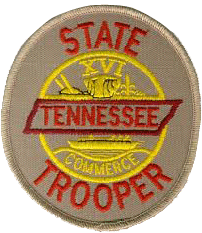
Tennessee Highway Patrol
In 1926, the State Police Act was passed which was patterned after the 1821 law that created the Texas Rangers. The TSP was comprised of fifteen men and was instituted primarily to collect fees and taxes. Needless to say, this organization was not popular with the citizens of the Volunteer State, nor with the media of the day who in one case labeled them as "obnoxious, bullying and disgraceful to the state".
By the late 1920's the proliferation of the motor car was growing significantly, as were broken traffic laws and highway fatalities. On December 14, 1929, the Tennessee Highway Patrol was born. The primary focus of the new state law enforcement agency was to protect, not prosecute law-abiding motorists. The THP were to enforce the traffic and revenue laws with courtesy and professionalism.
In 1930, 55 motorcycles and 5 patrol cars were purchased. The chief and four district chiefs had the cars while the patrol officers rode the motorcycles. During World War II, procurement of cars for patrol became difficult. In 1943, the THP located nine Ford flat-head 6 cylinder cars at a dealership in Long Island NY. Nine THP patrolmen were sent to the dealership and assigned to drive them back to Tennessee. The same process was repeated when seven more Fords were found in Philadelphia PA shortly thereafter.
These would be the last new patrol cars for the THP until after the war. In 1950, THP patrol cars began to display a red roof light, and in 1954, the THP began using radar for speed enforcement. In 1957, the THP became the first police agency in the U.S. to use helicopters in patrol work. In 1959, the title "Highway Patrolman" changed to "Trooper", and the change was reflected on the trunk deck of the cream and black colored patrol cars with the words "STATE TROOPER" in reflective markings. Side markings were also changed from the long-used oval to the state seal and the words "TENNESSEE STATE TROOPER" embossed on an outline of the distinctive state shape.
For a brief period in the late 1950's, the THP formed a select squad of motorcycle officers and dubbed them the "Yellow Jackets". The name derived from the garish yellow leather jackets and black trim the officers wore as well as the word "Yellow Jacket" emblazoned on the motorcycle along with the regular THP markings. In 1967, THP patrol cars went to 4 door sedans, automatic transmission, power brakes and air conditioning. In 1972, a tactical squad was formed known as the "Tact Squad".
In December of 1977, 100 brand new Plymouth patrol cars left Nashville with newly-sworn Troopers behind the wheel. They left in a convoy on Interstate 40 with overhead blue lights activated. This impressive sight left many a Nashville highway motorist riveted as the patrol cars began to diverge east and west to their new assignments throughout the state.
The following year saw the "one-officer-one-car" concept, with each patrol car being issued to each officer. This provided for additional profile, made call-out responses a lot quicker, and cut down on maintenance costs that pool cars had been known for. In November of 1999, the THP became an accredited police agency (CALEA) The THP is responsible for the enforcement of all federal and state laws relating to traffic.
Serving the entire state of Tennessee with substations in each of its 95 counties, the THP has district headquarters in eight locations as well as scale houses in 5 additional locations. The Tennessee Highway Patrol is responsible for investigating accidents involving property damage, personal injury, and fatalities. When personal injury or fatal accidents involve drugs or alcohol, the THP is responsible for prosecution in the courts and working with the Attorney General's Office.
The earliest confirmed recorded use of license plates for the Tennessee Highway Patrol was 1934. Written records prior to this time are so far non-existent, therefore early photographic evidence is all that can be relied upon for accuracy.
According to records from the Tennessee State Archives, 1934 saw license plates issued to members of the THP based on passenger car license numbers 296-819 through 296-829 and State Vehicle license plates S2-330 through S2-342. Passenger license plates for that year would be colored orange over dark blue and measuring 5" x 14". Formatting was ### followed by 34 embossed over a vertical TENN running down the center of the plate followed by ###.
State vehicle plates had the same formatting but colored black over white that year.
Tennessee was one of the few states in the USA prior to 1956 to have their license plates shaped like the state itself.
The "state shape" license plates were used by motorists in the Volunteer State for twenty years from 1936 until 1956 which was the year when standardized 6" x 12" license plates became mandated in North America.
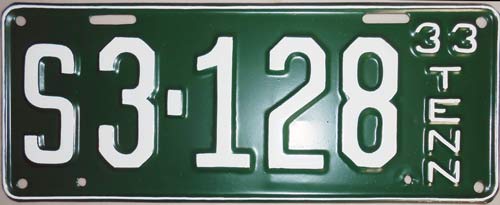 1933 State Vehicle issue.
1933 State Vehicle issue. 
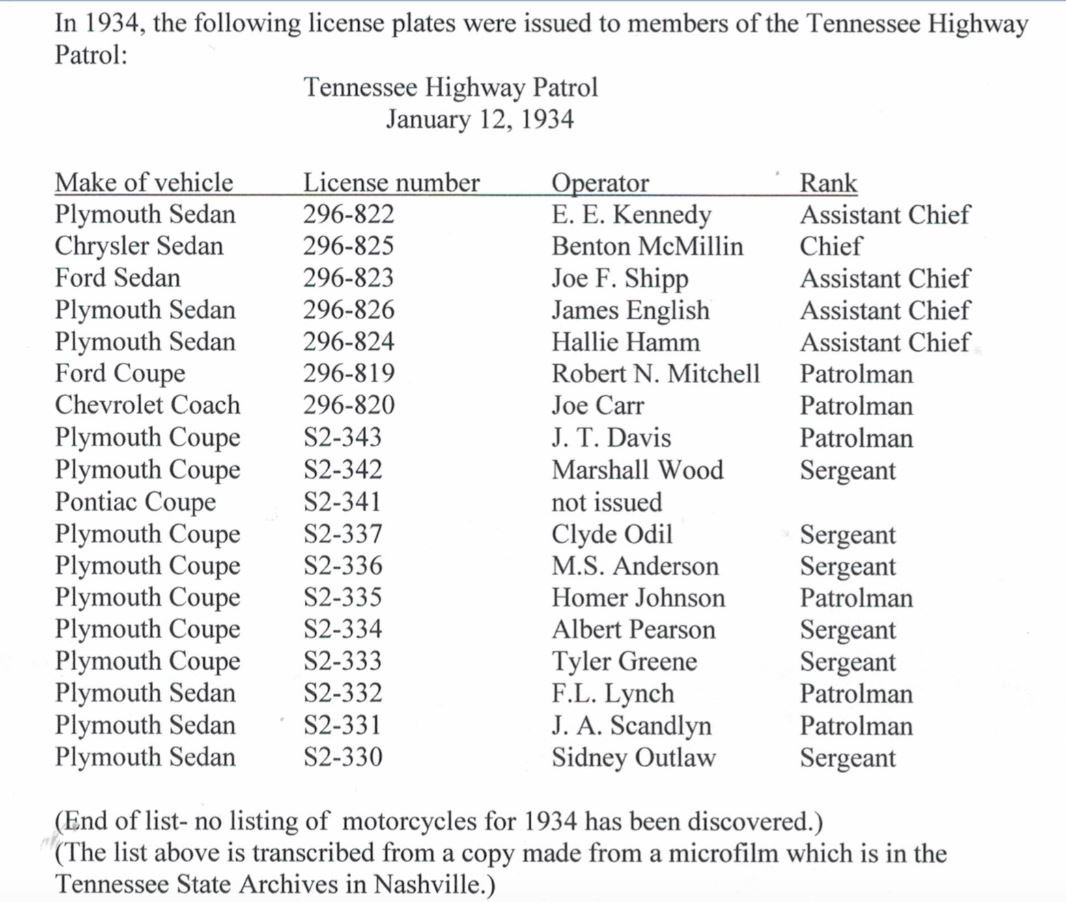 1934 list of Tennessee Highway Patrol personnel, their assigned vehicles and license plate numbers from the Tennessee State Archives.
1934 list of Tennessee Highway Patrol personnel, their assigned vehicles and license plate numbers from the Tennessee State Archives.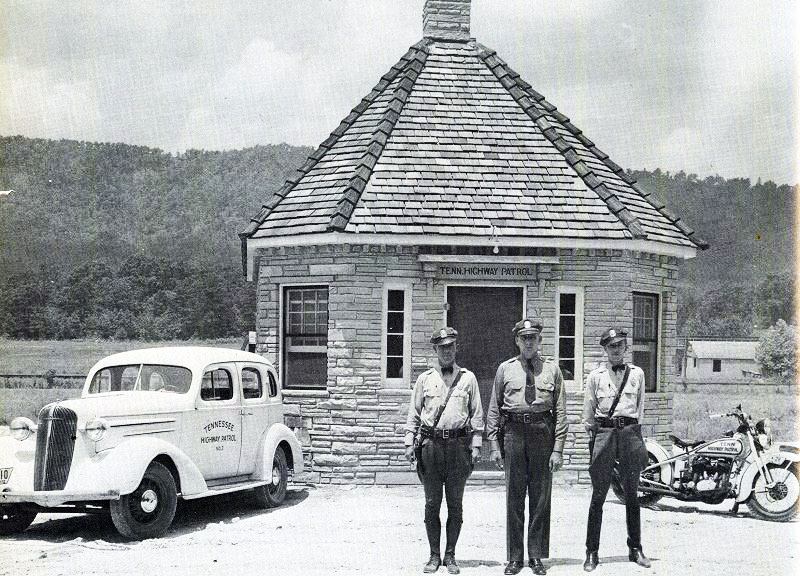
The 1937 license plate used by the Tennessee Highway Patrol that year was an embossed steel, state-shaped plate that had black characters painted over a pale yellow background.
The measurements of the plate were complex, as the top of the state is longer than the bottom, however the left side of the plate (Mississippi River) and the right side (Great Smoky Mountain border with North Carolina) are very close in length. The top of the plate measures 13 3/4" and the bottom of the plate measures 12 5/8" while the left side of the plate measures 5 1/2" and the right side of the plate measures 6". The plate has the word FREE as a prefix to a number, followed by a circular dash and the assignment number up to 3 digits. The bottom of the plate has TENN. embossed over the lower left mounting hole and 1937 embossed over the right mounting hole.
The term FREE was meant to indicate "free from fee", Tennessee's way of saying tax exempt at the time.
These FREE prefixed plates were believed used until 1939 when it's generally believed that THP began using state official use license plates in 1940.
It is not known if there were any reserved number blocs for use by the THP during this time.
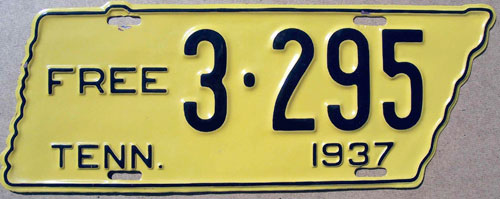 1937 issue. Embossed steel state shape.
1937 issue. Embossed steel state shape.
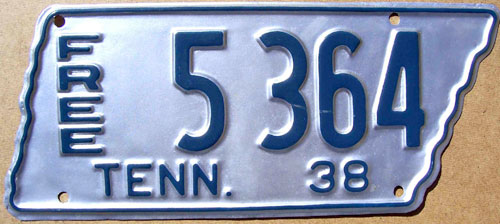 1938 issue. Embossed steel state shape.
1938 issue. Embossed steel state shape.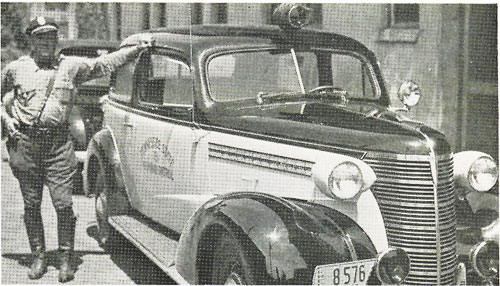 1938 Tennessee FREE license plate number 8 576
1938 Tennessee FREE license plate number 8 576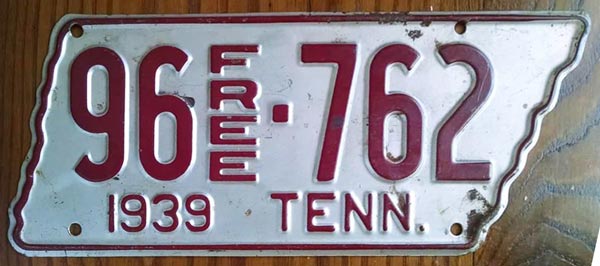 1939 issue. Embossed steel state shape.
1939 issue. Embossed steel state shape.
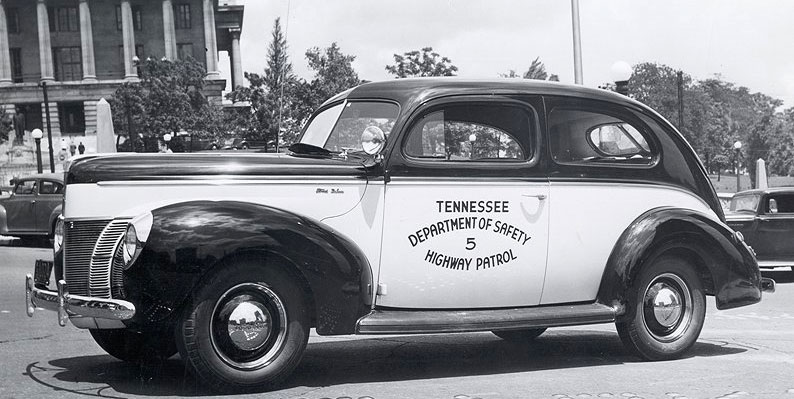
The period from 1940 until 1950 has absolutely no CONFIRMED information or evidence of what type of license plates were used by Tennessee Highway Patrol vehicles during that time. It is speculative at best, that multi-year state vehicle license plates were used during that time.
Until it can be proven otherwise, we will present the chronology for this time period as such:
1940: Embossed steel state shape. Approx. 5 1/2" x 12" x 6" x 10 3/4". Orange over black, STATE embossed vertical at left followed by dash and number up to four digits. TENN. 40 embossed along bottom.
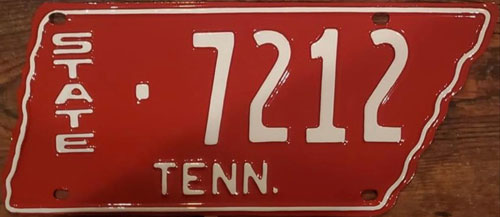 1941-1943 issue: Embossed steel state shape. Approx. 5 1/2" x 12" x 6" x 10 3/4". White over red, STATE embossed vertical at left followed by dash and number up to four digits. TENN. embossed along bottom.
1941-1943 issue: Embossed steel state shape. Approx. 5 1/2" x 12" x 6" x 10 3/4". White over red, STATE embossed vertical at left followed by dash and number up to four digits. TENN. embossed along bottom.
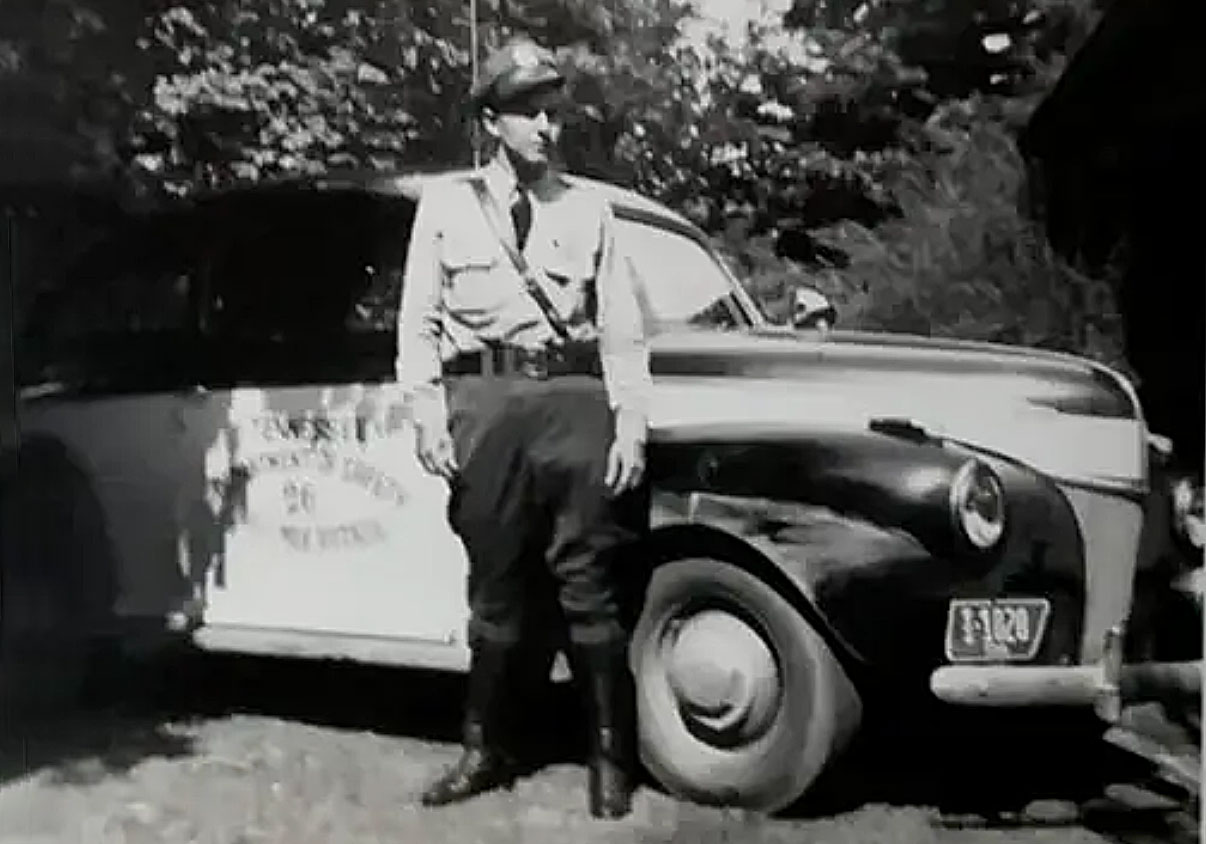 1942- Showing the multiyear STATE plate # 1020
1942- Showing the multiyear STATE plate # 1020
The following are not confirmed state official use license plates as there is no information about these types for this time period. However based on the format and coloring pattern of the time, these could be possible examples:
1944: Embossed steel state shape. Approx. 5 1/2" x 12" x 6" x 10 3/4". White over blue, STATE embossed vertical at left followed by dash and number up to four digits. TENN. 44 embossed along bottom.
1945: Embossed steel state shape. Approx. 5 1/2" x 12" x 6" x 10 3/4". Blue over silver, STATE embossed vertical at left followed by dash and number up to four digits. TENN. 1945 embossed along bottom.
1946: Embossed steel state shape. Approx. 5 1/2" x 12" x 6" x 10 3/4". Green over silver, STATE embossed vertical at left followed by dash and number up to four digits. TENN. 46 embossed along bottom.
1947: Embossed steel state shape. Approx. 5 1/2" x 12" x 6" x 10 3/4". White over black, STATE embossed vertical at left followed by dash and number up to four digits. 1947 TENN.
1948: Embossed steel state shape. Approx. 5 1/2" x 12" x 6" x 10 3/4". Black over pale yellow, STATE embossed vertical at left followed by dash and number up to four digits. TENN. 48 embossed along bottom. embossed along bottom.
1949: Embossed steel state shape. Approx. 5 1/2" x 12" x 6" x 10 3/4". Pale yellow over black, STATE embossed vertical at left followed by dash and number up to four digits. 1949 TENN. embossed along bottom.
It was around 1950 when the Tennessee Highway Patrol were issued with their own THP prefixed multi-year license plates. The state shape format and dimensions were the same as they were prior with the only exception that these plates had white characters over a red background, had the prefix THP followed by a small square dash followed by a number up to 3 digits with TENN. embossed along the bottom. They were used until 1954.
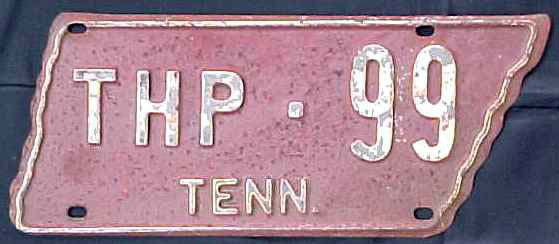 C. 1950-1952 issue.
C. 1950-1952 issue. 
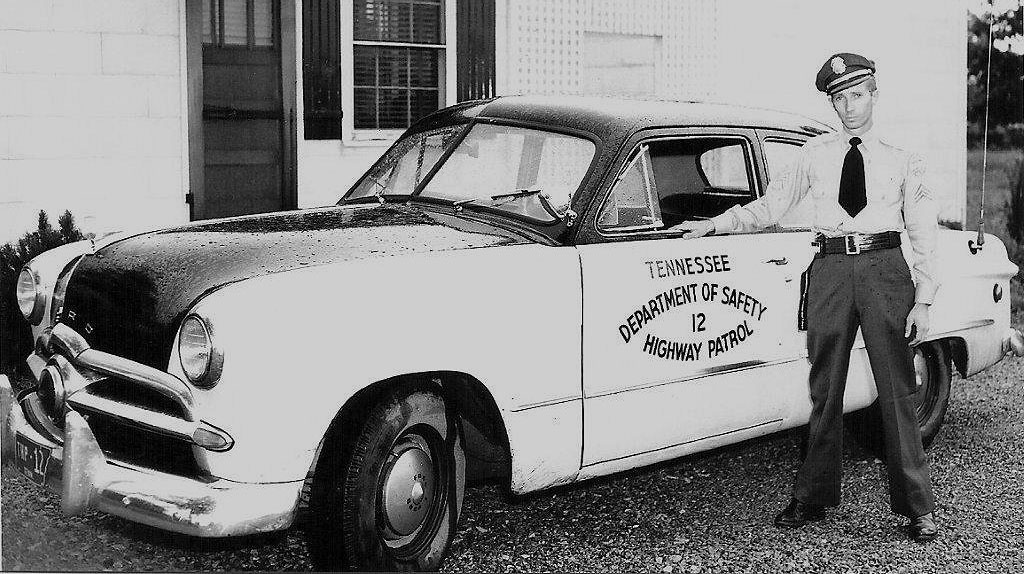
In 1952, a new agency-specific license plate for the Tennessee Highway Patrol was introduced. The plate was made of embossed steel and approximately 14 inches long by about 5 1/2 inches on either end. It has white embossed characters over a deep green background. The prefix THP was followed by a small square dash followed by the assignment number up to three digits and TENN stacked vertically down the right side of the plate. The slogan DRIVE SAFELY was embossed along the bottom. These plates were used until 1956 when state shaped license plates were no longer permitted due to an international design standard introduced that year.
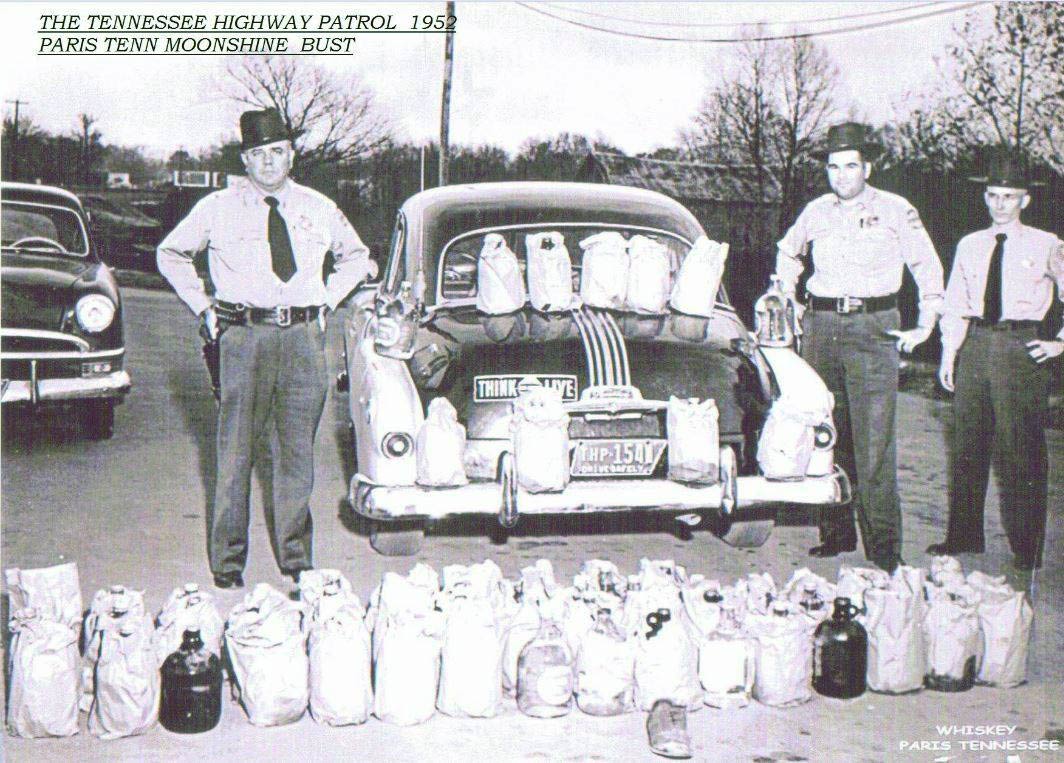 Bootleg Whiskey-Bust 1952- Paris TN
Bootleg Whiskey-Bust 1952- Paris TN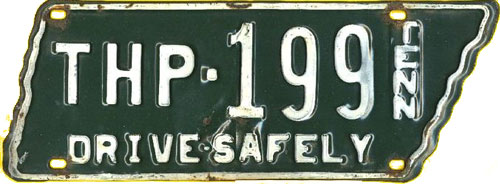 1952-1956 issue.
1952-1956 issue. 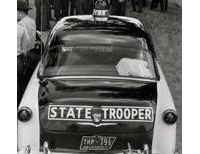
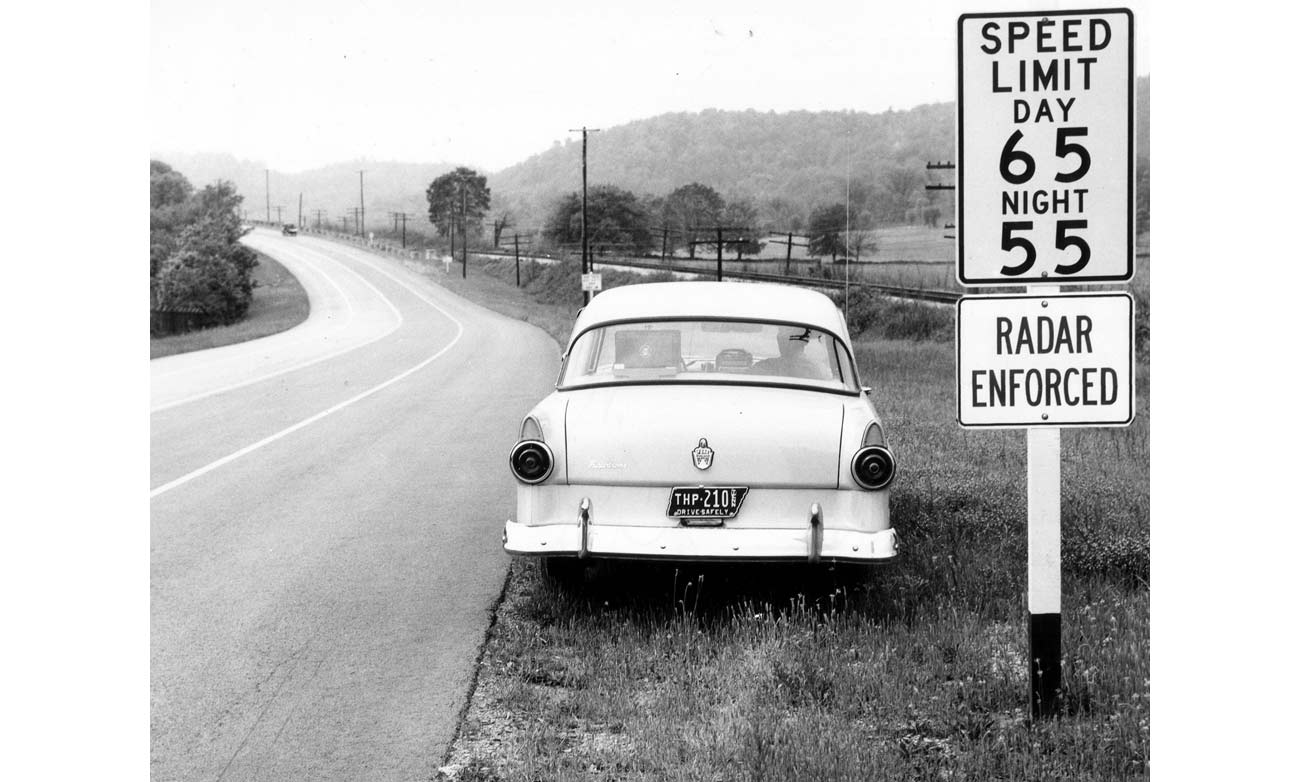 Unmarked THP radar unit-1955.
Unmarked THP radar unit-1955. 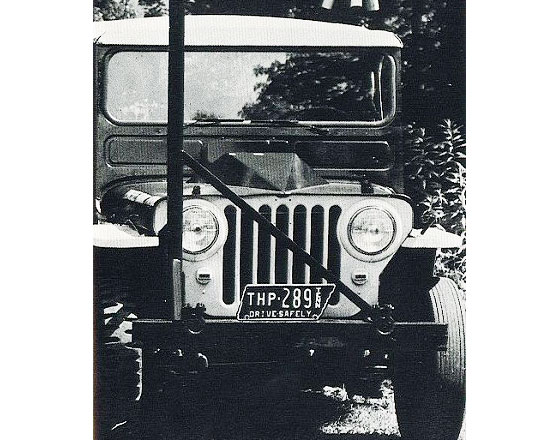
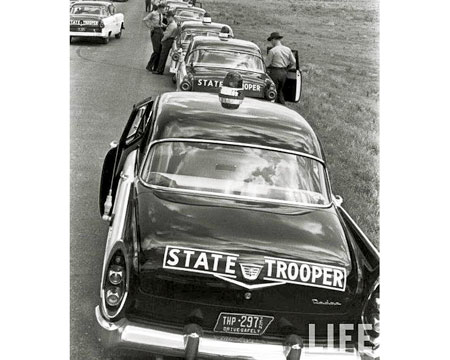
In 1956 when the new 6" x 12" uniform shape became mandated for all future license plates in North America, it was not met with much approval by the motorists of the Volunteer State. Tennesseans found a certain degree of pride in their unique state shape license plates they had run on their motor vehicles for three decades. As a result for 1957, the state incorporated the state shape within the confines of the "tin rectangle".
The Tennessee Highway Patrol license plates used for 1957 and 1958 were made of embossed steel and measuring 6" x 12" as required. They had embossed white characters over a deep green background. The slogan DRIVE SAFELY was embossed at the top center of the plate. The THP prefix was followed by a number up to three digits but with no dash and surrounded by an embossed outline of the state which occupied most of the center of the plate. TENN was embossed at the bottom center of the plate.
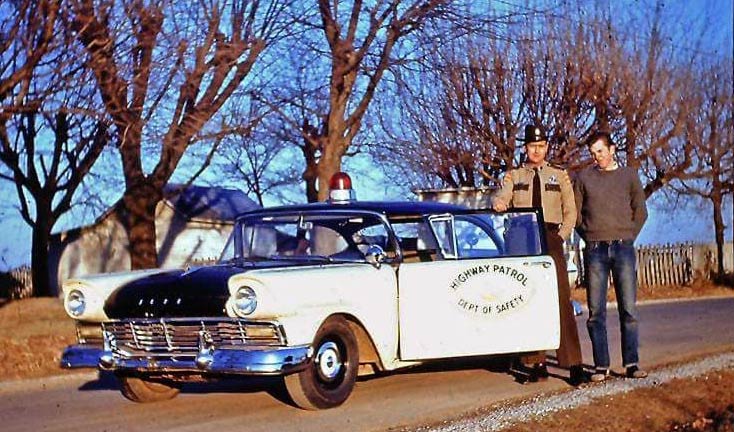 (Courtesy John Wayne)
(Courtesy John Wayne)
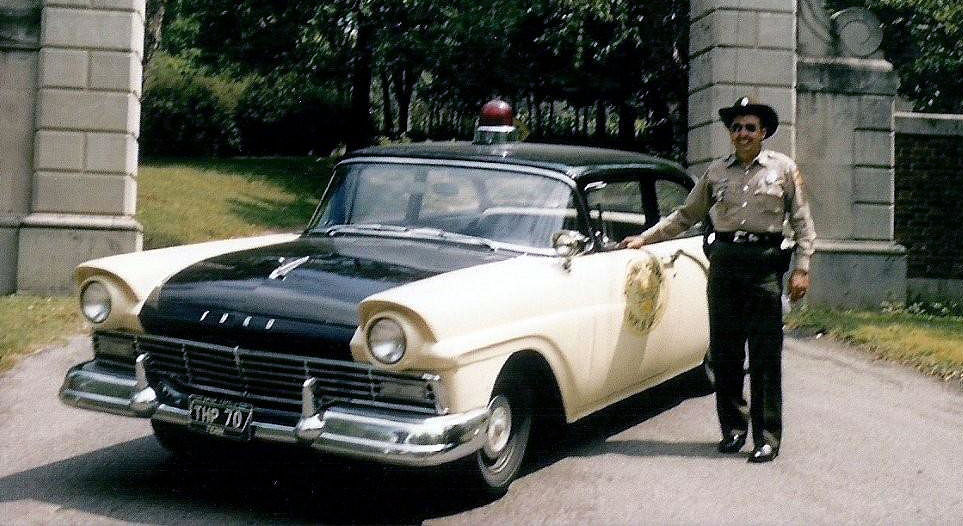
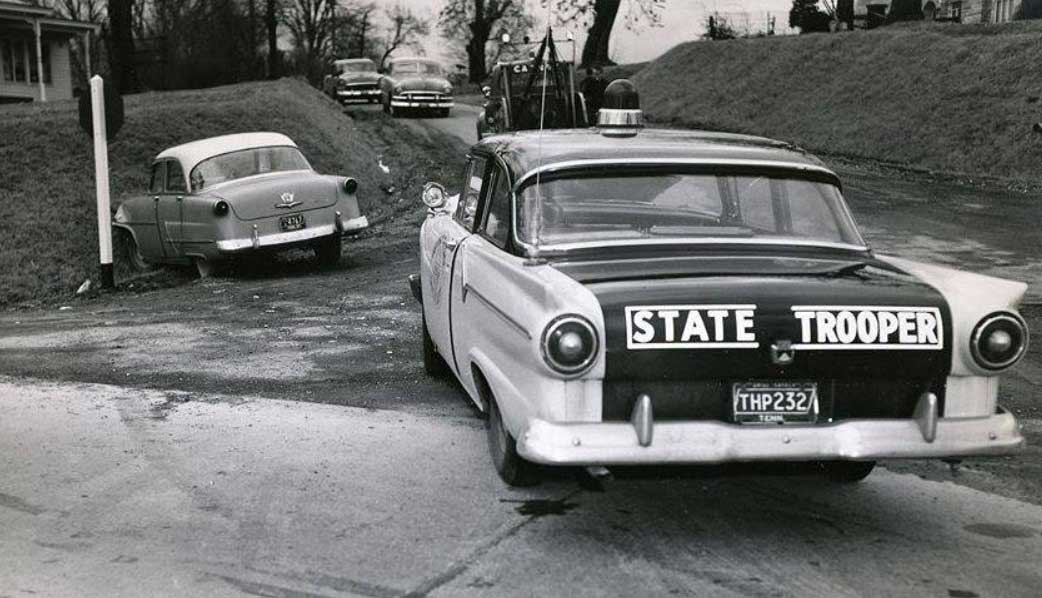 District 2 (Chattanooga) Car 32 on scene circa 1957/58
District 2 (Chattanooga) Car 32 on scene circa 1957/58
(Courtesy Jim Aitken)
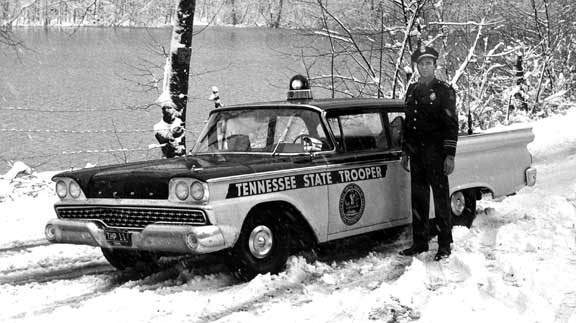
In 1959, although the color scheme of white embossed characters over a deep green background continued, the layout changed. The embossed steel license plates used by the Tennessee Highway Patrol from 1959 until 1961 had TENN surrounded by a smaller state outline embossed in the upper center of the license plate between the upper mounting holes. The prefix THP was followed a square dash and a number up to three digits.
These plate were used until 1961 when the format remained the same, but the color scheme changed to white over light blue.

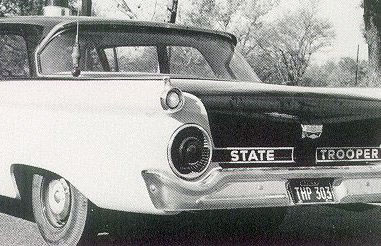 1959-1960 issue.
1959-1960 issue. 
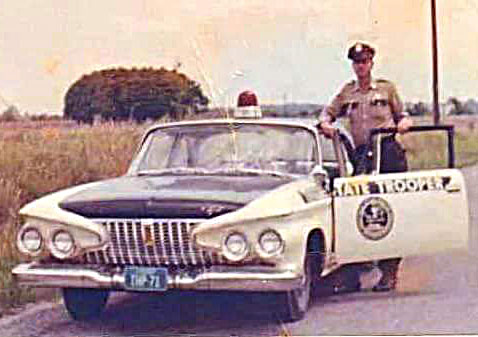 1959-1960 issue.
1959-1960 issue. In 1961, license plates for the Tennessee Highway Patrol were formatted the same as they had been for 1959 and 1960, however the background color was changed from deep green to light blue. It was also in this year that it was confirmed that THP District codes were used for the assignment numbers. THP-1 was issued to the Governor of the state, THP-2 was issued to the Commissioner of Public Safety, THP-3 was issued to the Colonel of the THP and the numbers continued in rank succession for the rest of headquarters up to THP-99.
The District assigned license plates for the THP during this time was as follows:
THP-100 series: District 1 (Knoxville)
THP-200 series: District 2 (Chattanooga)
THP-300 series: District 3 (Nashville)
THP-400 series: District 4 (Memphis)
THP-500 series: District 5 (Kingsport- later Fall Branch)
THP-600 series: District 6 (Cookeville)
THP-700 series: District 7 (Lawrenceburg)
THP-800 series: District 8 (Jackson)
These THP license plates were issued in fours to keep extra in stock as it was quickly discovered that these license plates were very prone to premature rusting and paint failure.
Despite this problem, these license plates were used on all marked THP vehicles until 1973.
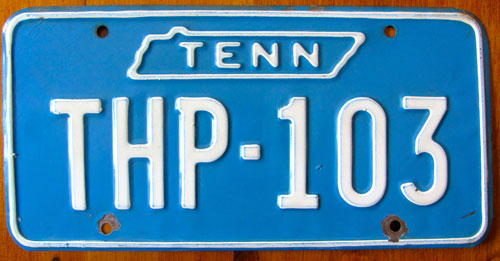 1961-1973 issue. Embossed steel.
1961-1973 issue. Embossed steel.
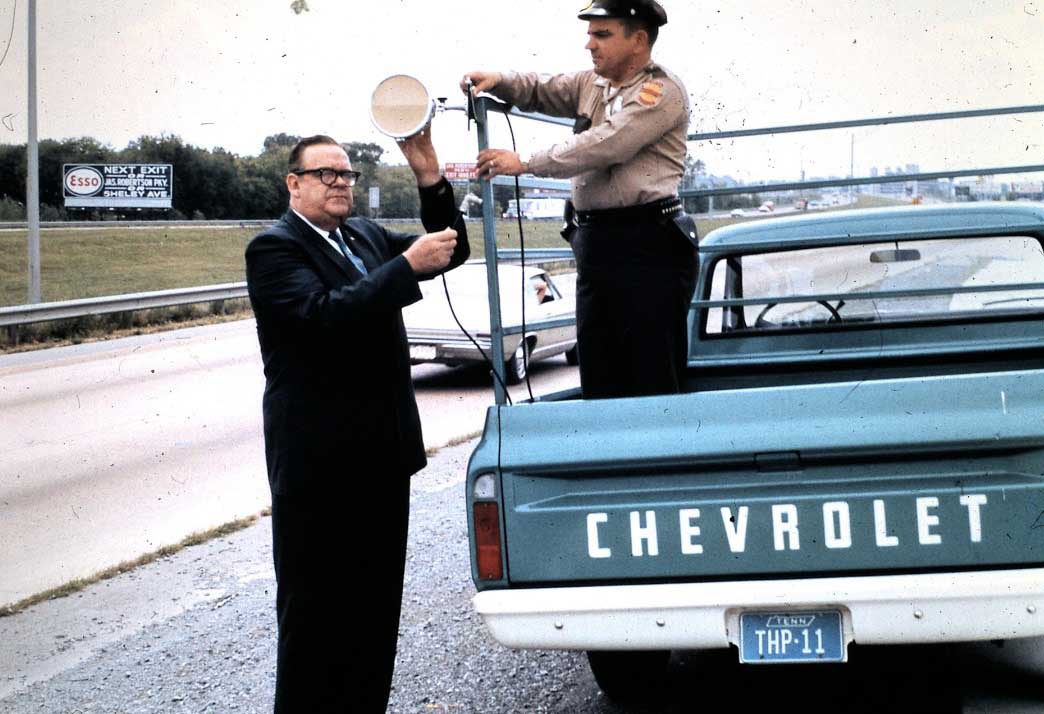
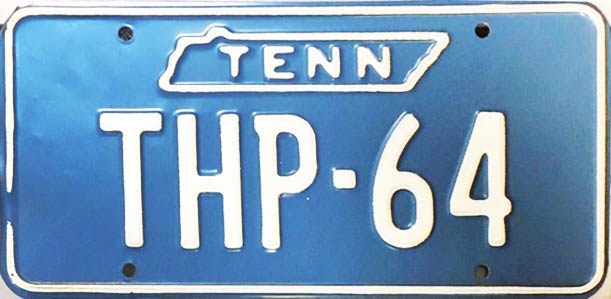 1961-1973 issue. Embossed steel.
1961-1973 issue. Embossed steel.
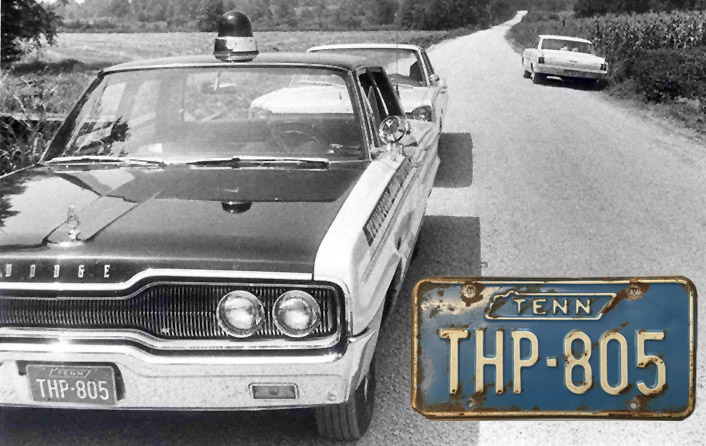
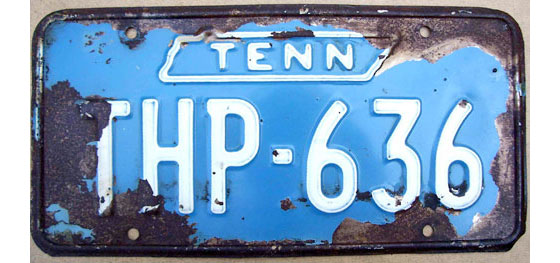 1961-1973 issue. Embossed steel.
1961-1973 issue. Embossed steel.
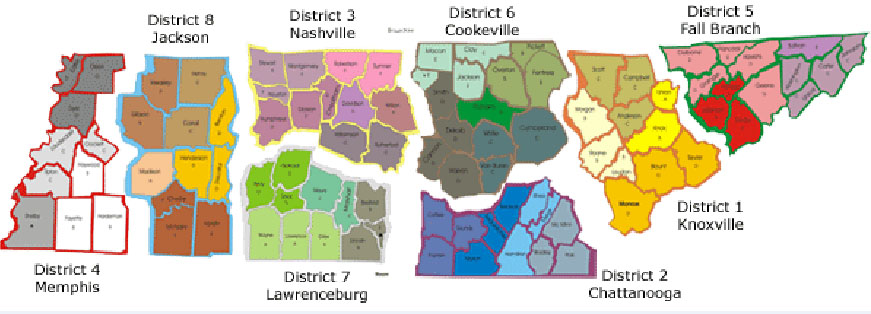
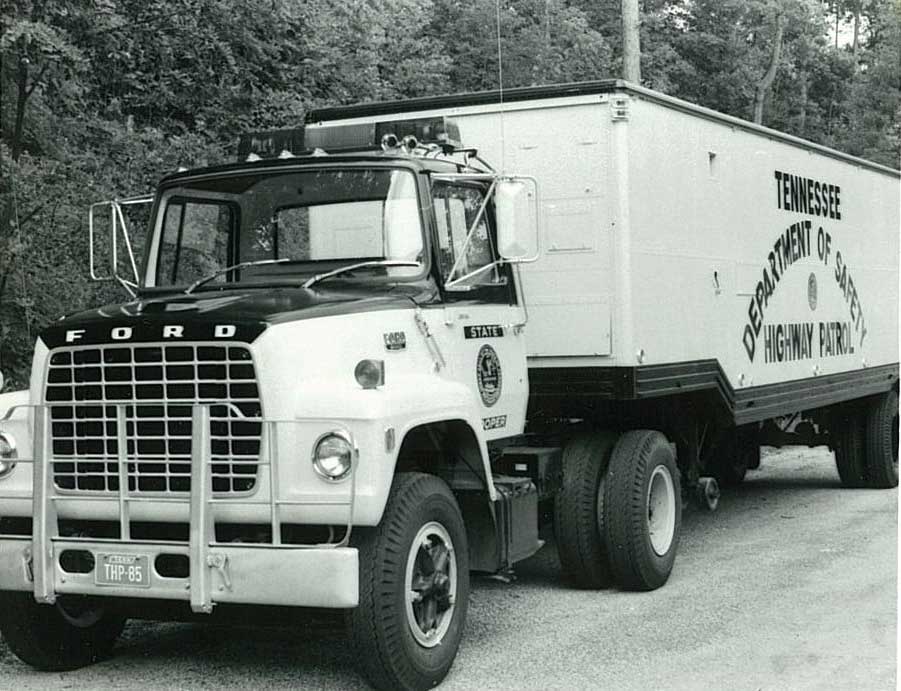 THP support semi-truck wearing THP-85
THP support semi-truck wearing THP-85It was also during this time in 1961 that the state of Tennessee issued a new variation of state vehicle license plate as well which was also used in some instances by the THP. The plates were identical in layout and white over light blue color scheme, but used a department code number followed by the letter S for state and then followed by 4 numbers starting at 0001. The department code for the THP was 19. Plates of this configuration with confirmed numbers for use by THP were 19S0023, 19S0024 and 19S0035.
These plates were also prone to the same surface material failures as the THP prefixed plates of the same era.
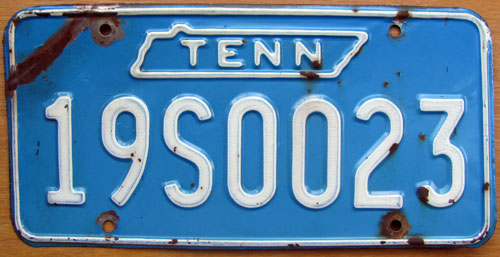 1961-1973 State vehicle issue.
1961-1973 State vehicle issue. 
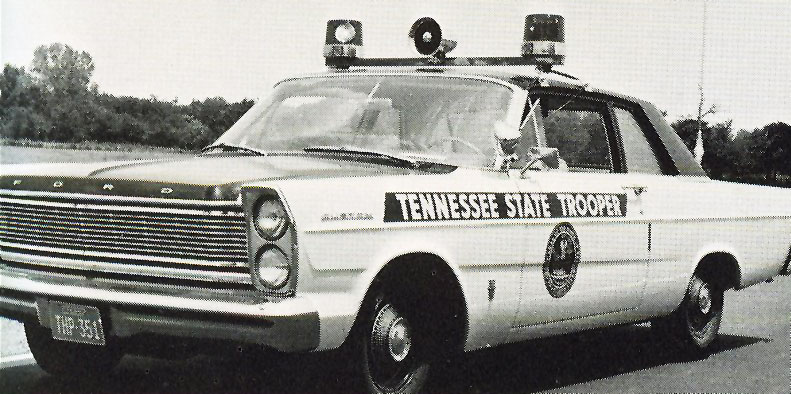
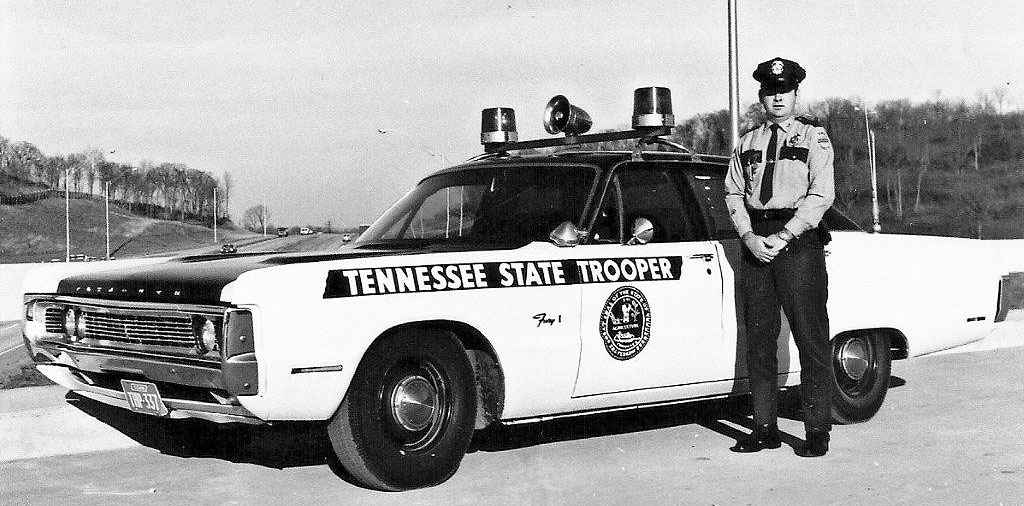
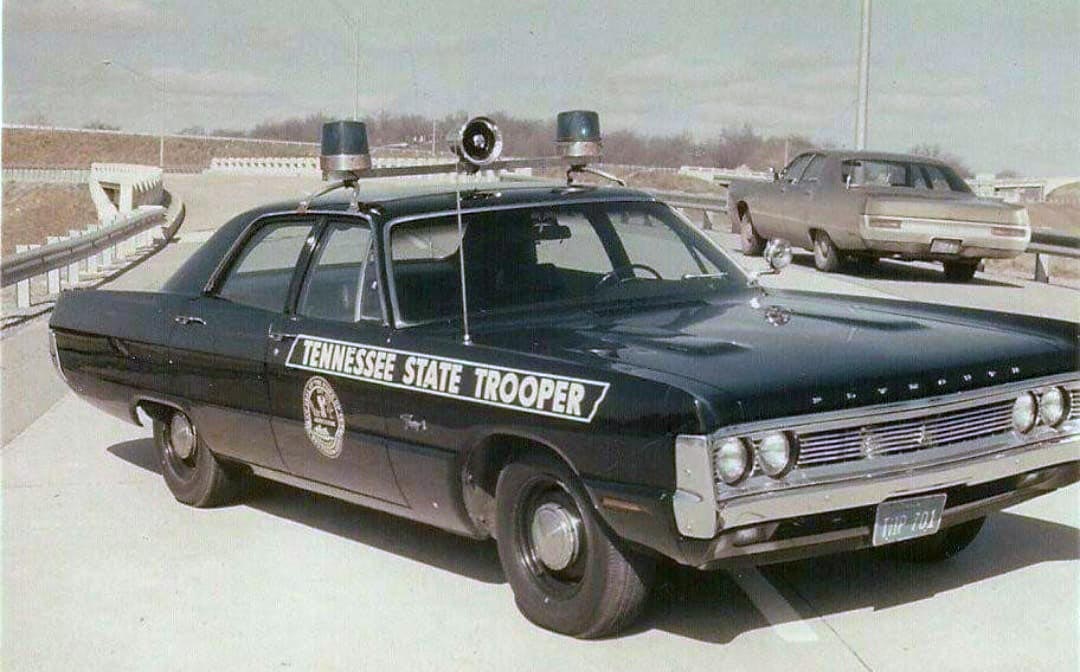 1970 "All black" Plymouth- THP 701 (District 7- Lawrenceburg)
1970 "All black" Plymouth- THP 701 (District 7- Lawrenceburg)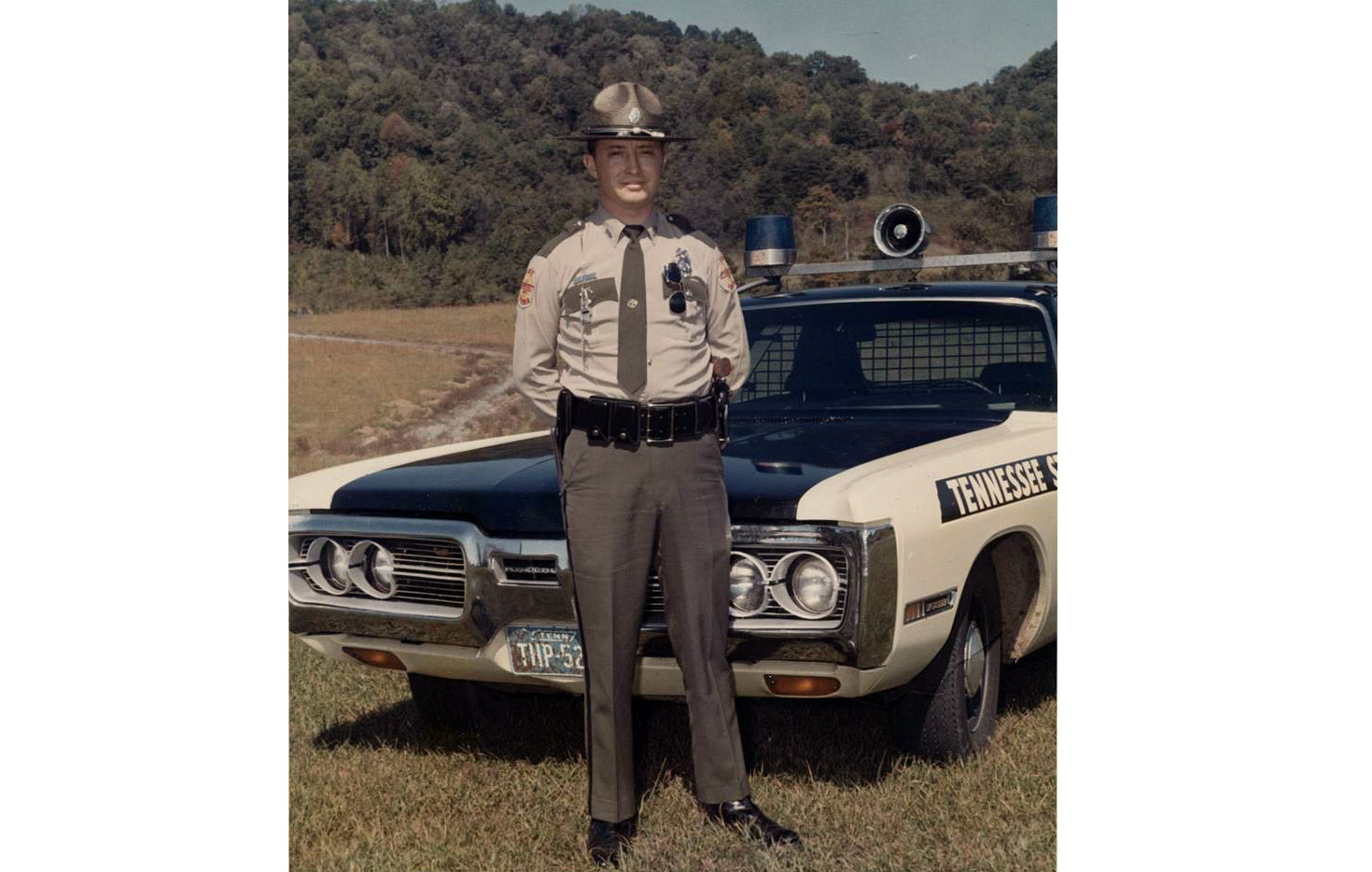 Ptlm Russ Timpton- District 5 (Fall Branch) Hawkins County 1972.
Ptlm Russ Timpton- District 5 (Fall Branch) Hawkins County 1972.For reasons unknown, in 1974 the state of Tennessee no longer issued special license plates for the Tennessee Highway Patrol. Gone were the THP prefixed plates and a return to general state vehicle license plates took place. The plates were made of embosed thin aluminum and colored white over deep green. The embossed TENN inside the state shape as seen on the previous issue was elevated higher in the top center of the plate whereby the top of the state outline was incorporated into the border of the plate itself. At the bottom center of the plate was GOV'T SERVICE embossed between the lower mounting holes. A registration number beginning with the letter S (state) was followed by a vehicle code number followed by a dash, another letter and a number of three digits.
The code numbers for these plates were as follows:
S1: Cars and some vans- Primary for THP
S2: Ambulances
S3: Buses of 9 passengers or more
S4: Pickup, panel truck, car up to 6999 lbs.
S5: Pickup, panel truck, carry-all crew cab or cargo truck up to 12,500 lbs.
S6: Trucks 7000 lbs. and over
S7: Wreckers, tractors and all diesels
S8: Semi and other trailers
S9: Fire Truck and other Special Motorized Equipment
S0: THP/Dept of Safety motorcycles.
EX: Off road vehicles
Marked THP cars seen during this time had confirmed plate numbers S1-B734, S1-B960, S1-C882 and S1-K013.
A THP truck seen below with number S6-H832.
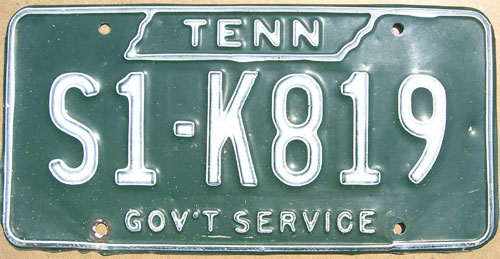 1974-1976 state vehicle issue.
1974-1976 state vehicle issue. 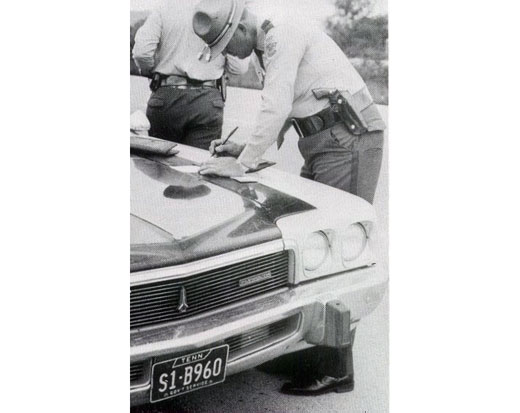 1974
1974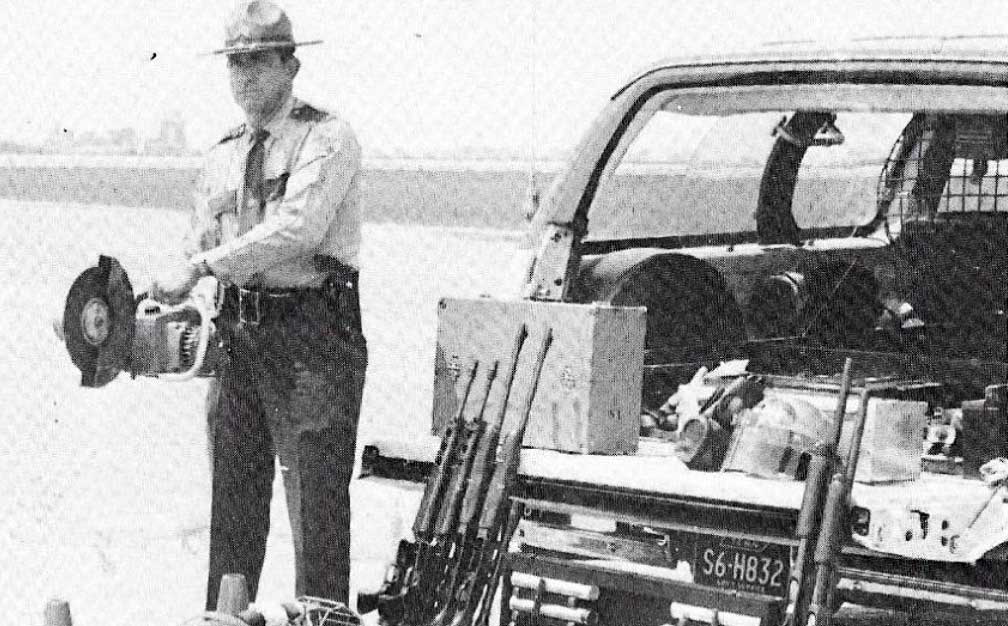 Tennessee "Green tag" with S6 designation: Truck 7000 lbs or over.
Tennessee "Green tag" with S6 designation: Truck 7000 lbs or over.In 1976, a new state government service plate using a reflective light green background on thicker aluminum was introduced and used by the THP. The layout, format and code system as used on the 1974 base continued, however the dies used for the characters were also different besides the reflective background.
Confirmed THP numbers during this time were: S1-P541, S1-P584, S1-P891, S1-T458, S1-T465, S1-T537, S1-T686, S1-T963, S1-U047, S1-U072, S1-U078, S1-U724, S1-V079, S1-V546.
A THP van observed in 1985 had number S4-V967 and a trailer seen the same year had number S8-I669
These plates were used until around 1985.
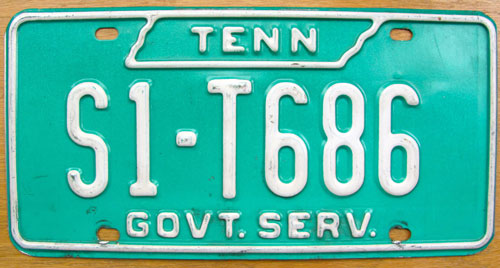 1976-1985 state vehicle issue.
1976-1985 state vehicle issue. 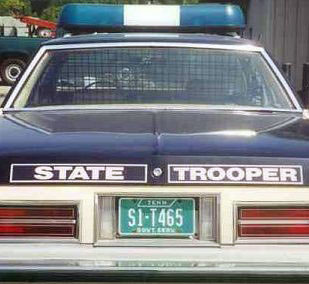
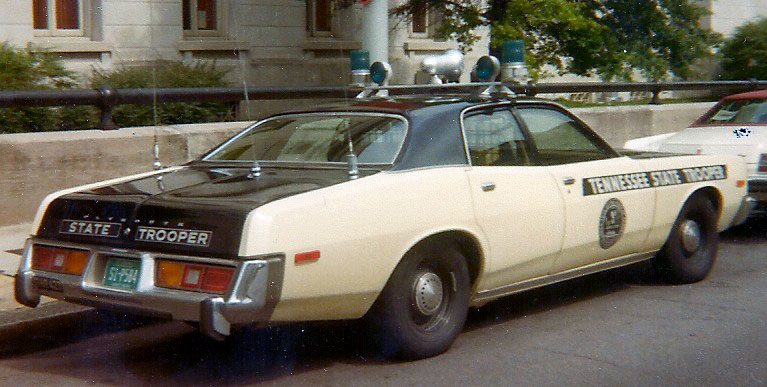
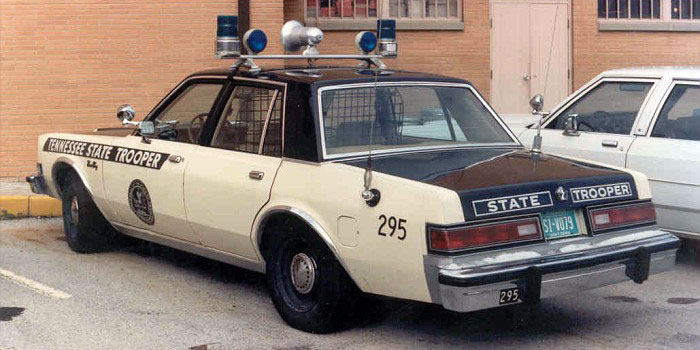
By 1985, a new version of the state government service license plates was introduced.The plate was still made of embossed aluminum but had a step border and the state outline around TENN at the top of the plate was dropped. A different die font was used for the registration number as well, but the vehicle code classifications remained unchanged.
There was no use of the letters I, O, Q or Z due to similarity to numbers and conflicts with certain computer program requirements of the THP.
These plates were displayed on the rear of THP patrol vehicles until a new graphic THP license plate was launched in 1991.
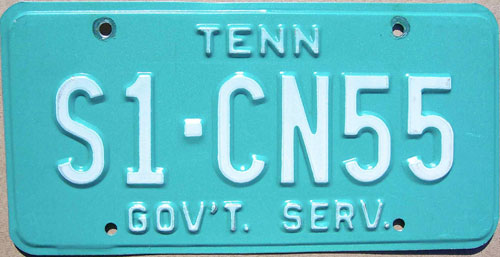 1985-1990's state vehicle issue. Embossed aluminum.
1985-1990's state vehicle issue. Embossed aluminum.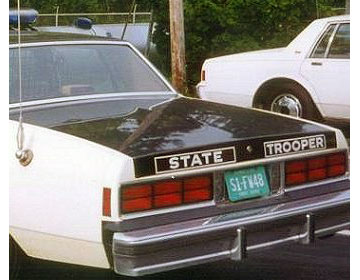
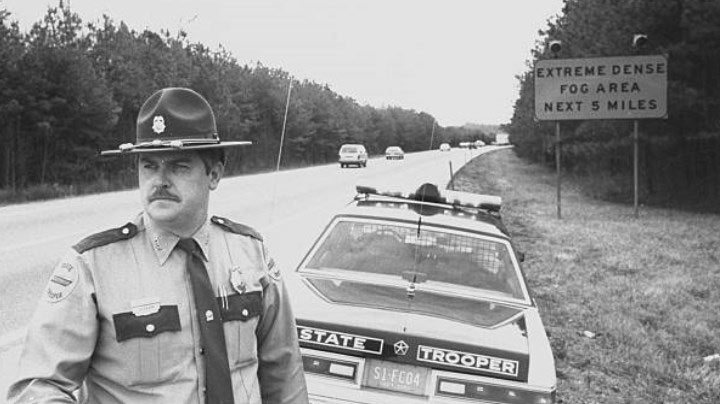
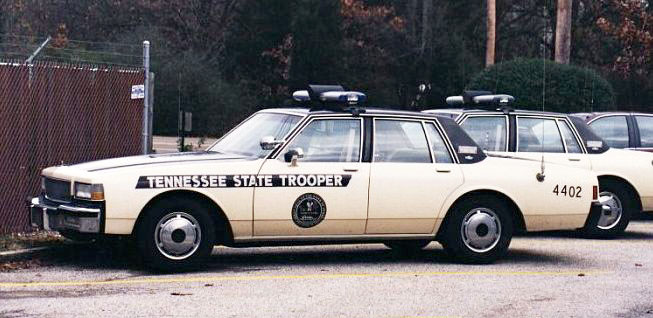
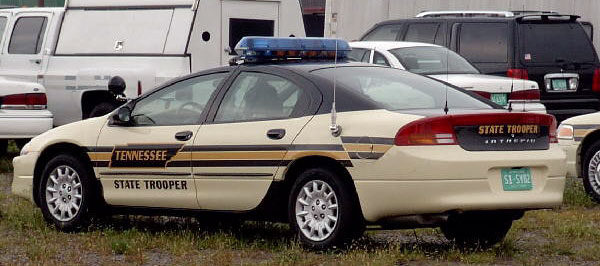
In 1991, the Tennessee Highway Patrol not only were re-issued agency-specific license plates which they hadn't had in almost 20 years, but were issued beautiful silkscreened graphic THP license plates. The reflective tan aluminum plates had the state name silkscreened in black at the top center between the upper mounting holes. STATE TROOPER was silkscreened in black along the bottom center of the plate between the lower mounting holes. The Tennessee state seal was silkscreened in black and occupied the left center field of the plate. A four digit number was embossed in black to the right of the seal. The embossed number began at 0001 and was believed issued to the Governor, 0002 was issued to the Commissioner of Public Safety, 0003 issued to the Colonel of the THP and the numbers continued in rank succession for the rest of headquarters up to THP-0099.
As with the last general issue of agency-specific THP license plates from 1961 to 1973, District numbering was used once again.
The District assigned license plates for the THP during this time were as follows:
1100-1200 series: District 1 (Knoxville)
2200-2300 series: District 2 (Chattanooga)
3300-3400 series: District 3 (Nashville)
4400-4500 series: District 4 (Memphis)
5500-5600 series: District 5 (Fall Branch)
6600-6700 series: District 6 (Cookeville)
7700-7800 series: District 7 (Lawrenceburg)
8800-8900 series: District 8 (Jackson)
Although it seemed like the uninspiring Government Service "green plates" for the THP were gone for good, it was not entirely so. All THP vehicles still had to be registered using the state government "green plates", however those plates were mounted inside the trunk area of the individual THP vehicle while the graphic THP plate was displayed on the rear of the vehicle.
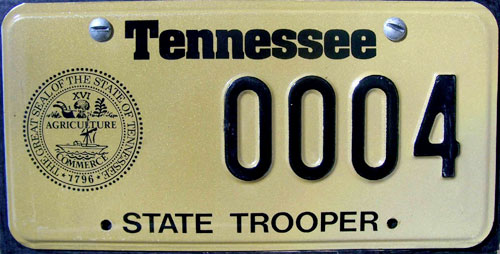 1991-Current issue.
1991-Current issue. 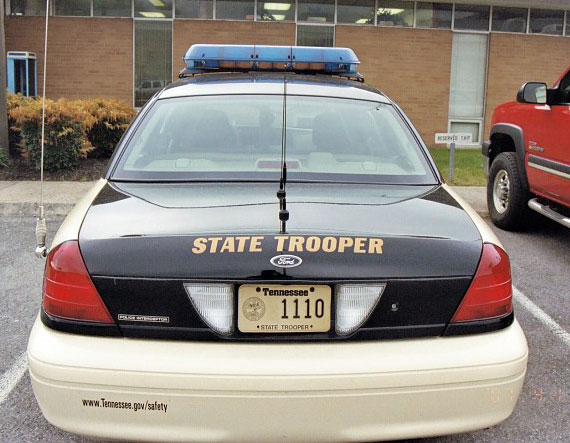
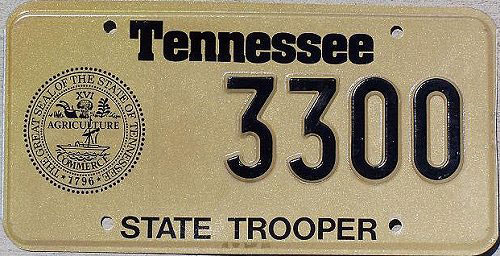 1991-Current issue.
1991-Current issue. 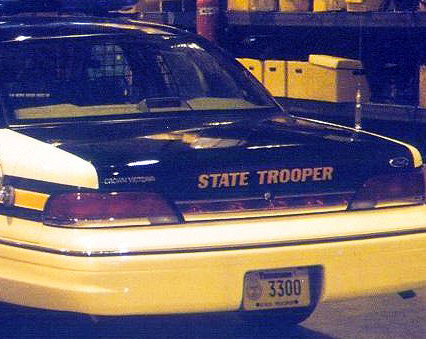
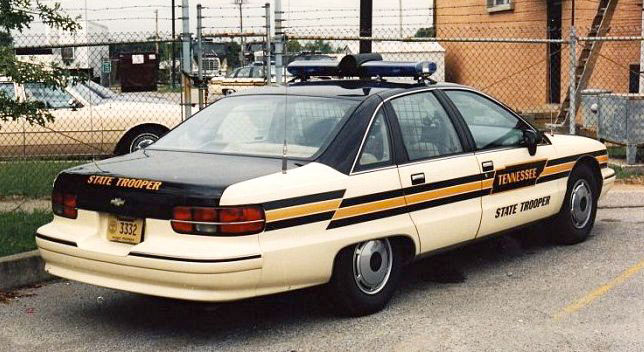
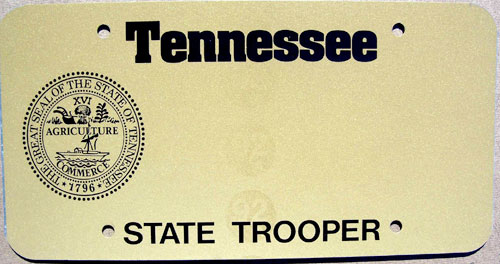 1991-Current issue blank.
1991-Current issue blank. 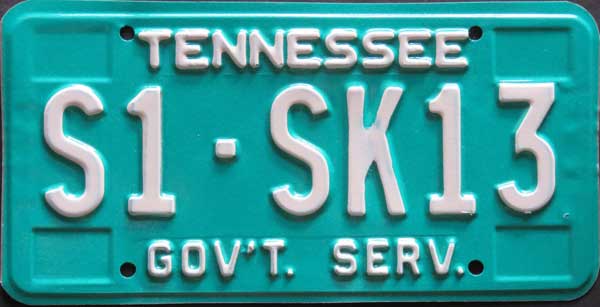 1990-2006 base. S1 for passenger car.
1990-2006 base. S1 for passenger car.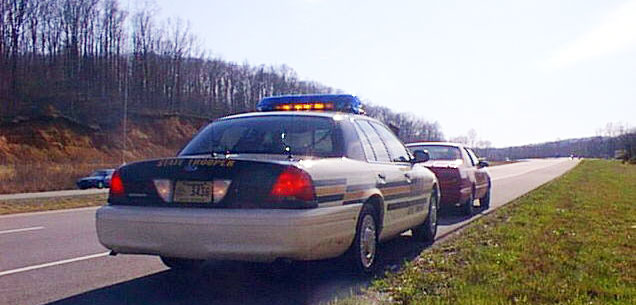
Around late 2006, the state of Tennessee began manufacturing license plates that had all features silkscreened including the registration numbers. It was around this time when license plates issued to the Tennessee Highway Patrol also were issued license plates similar to the the design used since 1991, but with the assignment number silkscreeened instead of embossed.
These plates also had a thin white outline where the step border was in place.
The practice of registering the THP vehicle with the state government "green plates" continued with this series.
The green plate was still mounted inside the trunk area of the individual vehicle.
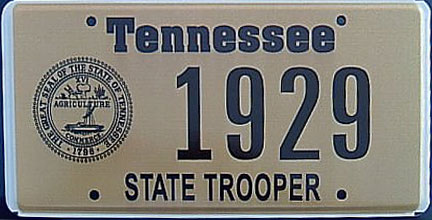 Circa 2007-Current issue.
Circa 2007-Current issue. 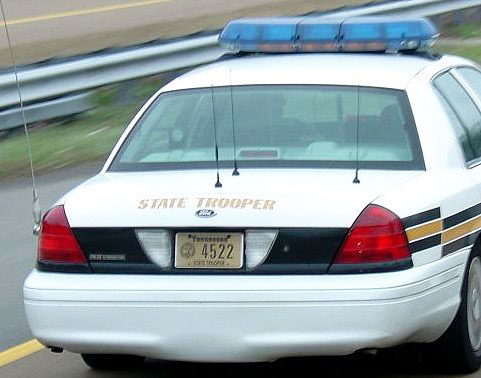
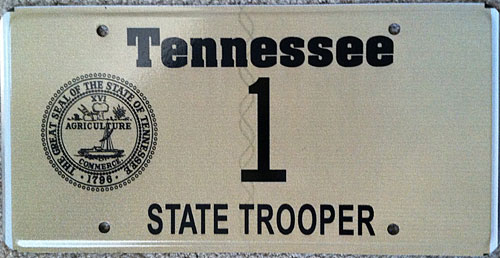 Circa 2007-Current issue.
Circa 2007-Current issue. 
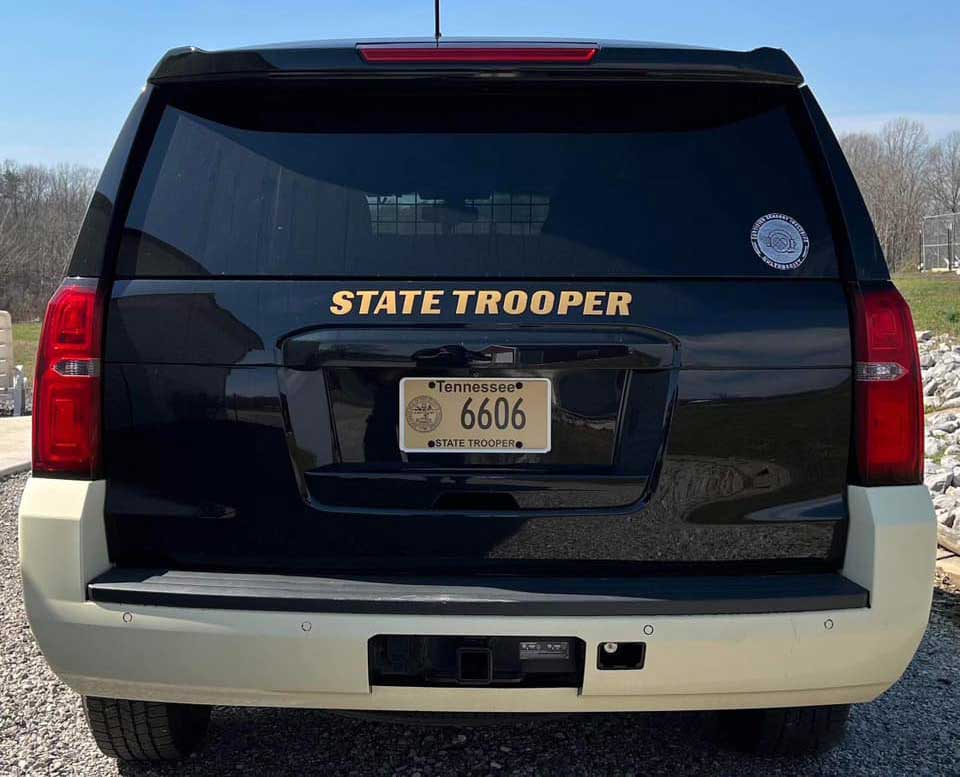 District 6 Lieutenant (Cookeville)
District 6 Lieutenant (Cookeville) 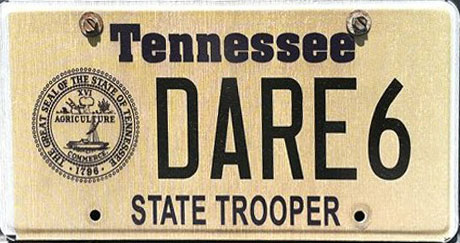 Circa 2007-Current issue.
Circa 2007-Current issue. 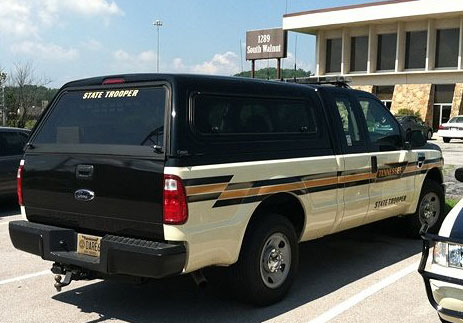 DARE Unit for District 6 (Cookeville)
DARE Unit for District 6 (Cookeville)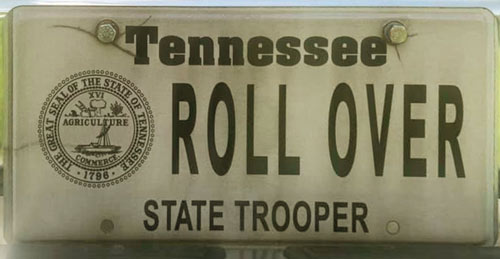 Circa 2007-current issue.
Circa 2007-current issue. 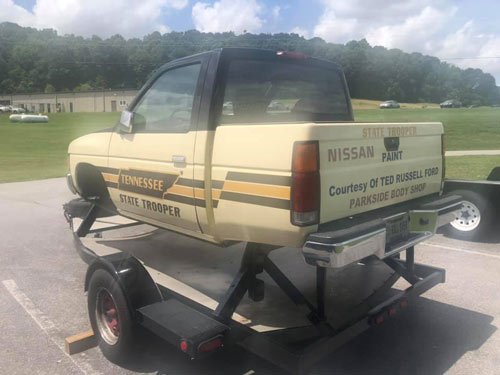 (Courtesy Jerry Cuffe)
(Courtesy Jerry Cuffe)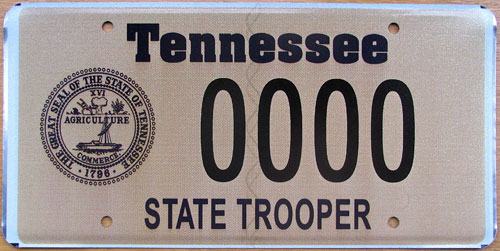 Circa 2007-Current sample issue. Silkscreened aluminum.
Circa 2007-Current sample issue. Silkscreened aluminum.
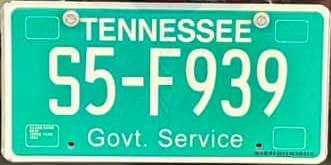 2000's-Current state government issue.
2000's-Current state government issue.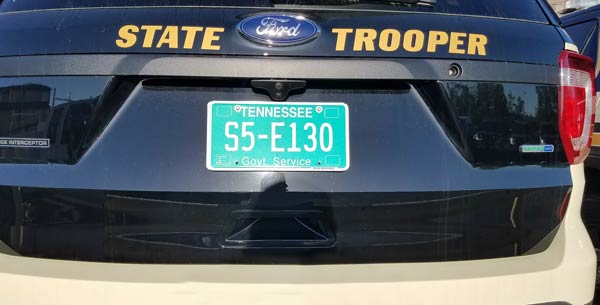 2000's-Current state government issue.
2000's-Current state government issue.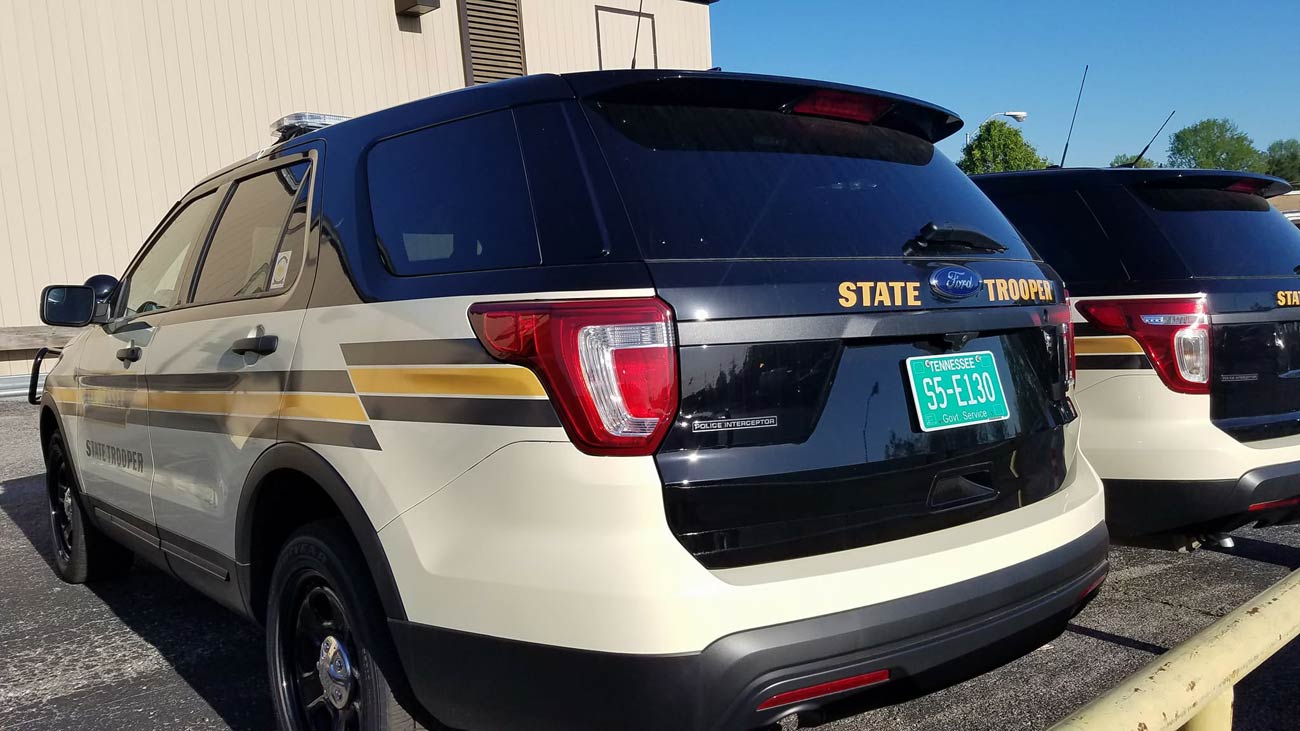
In early 2019, the Tennessee Highway Patrol marked its 90th Anniversary. The Patrol decided to create and issue old style Tennessee "state shape" license plates to help celebrate the occasion. The plate is made of silkscreened aluminum and colored tan over black. The four digit assignment number based on the District occupies the left to center field of the plate. To the right of the number is a circular emblem with a gilded circumference surrounding a roundel that says: TENNESSEE HIGHWAY PATROL- 90 YEARS OF SERVICE. The center of the emblem features a silver THP badge flanked by a segment of the American flag to the left and a segment of the flag of Tennessee to the right.
The bottom of the plate has TENN. followed by 1929-2019.
It has been stated that THP troopers will be able to retain one plate from the set upon the completion of the Anniversary.
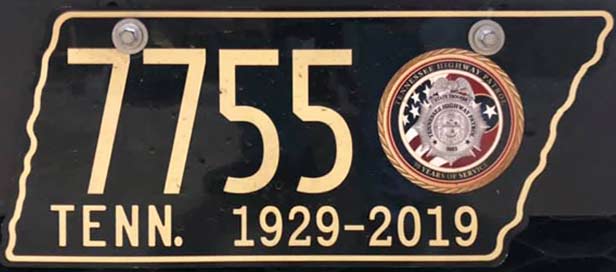 2019-Current issue. 90th Anniversary.
2019-Current issue. 90th Anniversary.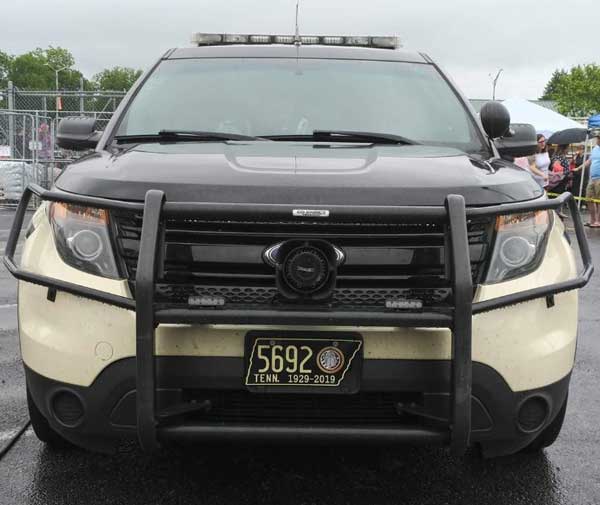 District 5
District 5 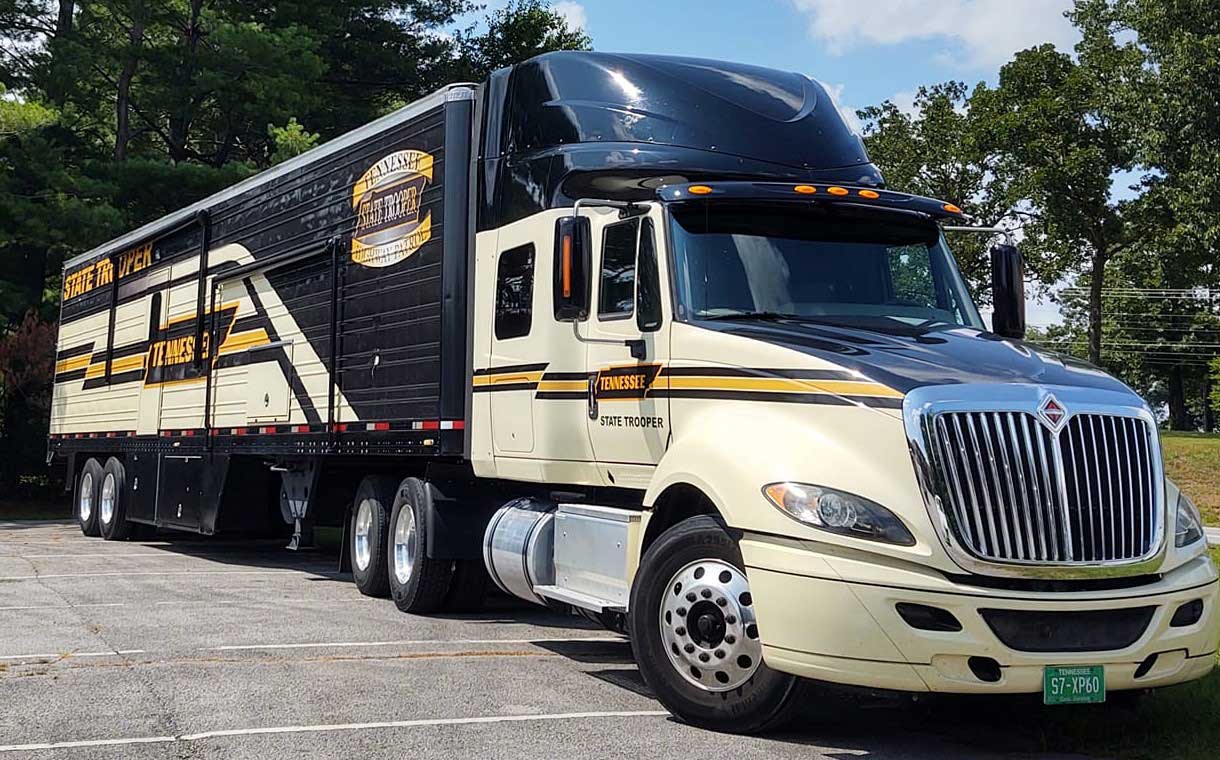 THP Support Semi Truck. S7 designation on green plate.
THP Support Semi Truck. S7 designation on green plate.Tennessee is a state that does not require a front license plate to be displayed on a motor vehicle. As a result of this, a variety of "booster" license plates have been used on the front of THP vehicles yet most still display no front plate at all.
Some have been official issues and some have not.
Here are some examples of what has been used.
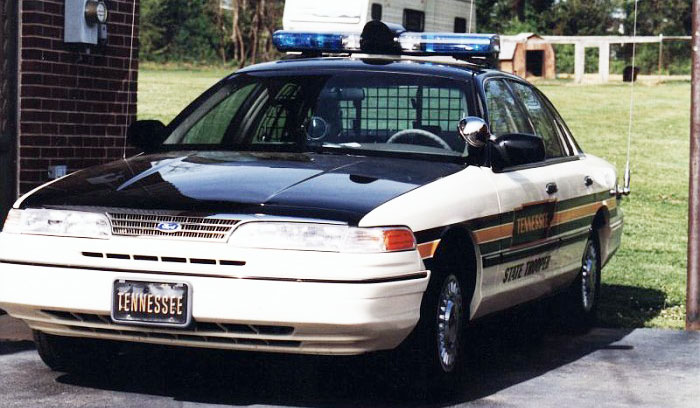
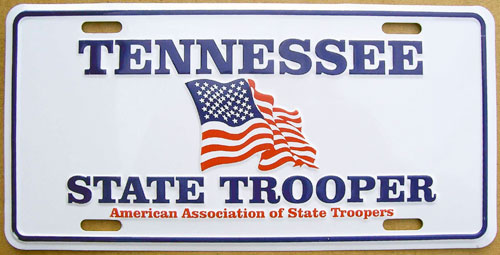 American Association of State Troopers booster plate.
American Association of State Troopers booster plate.
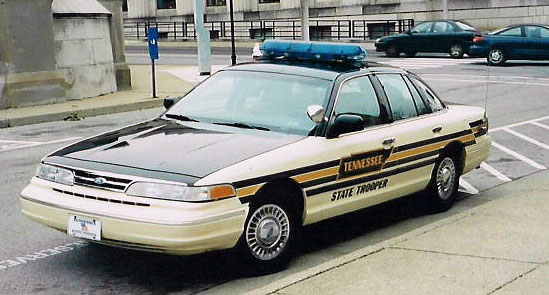
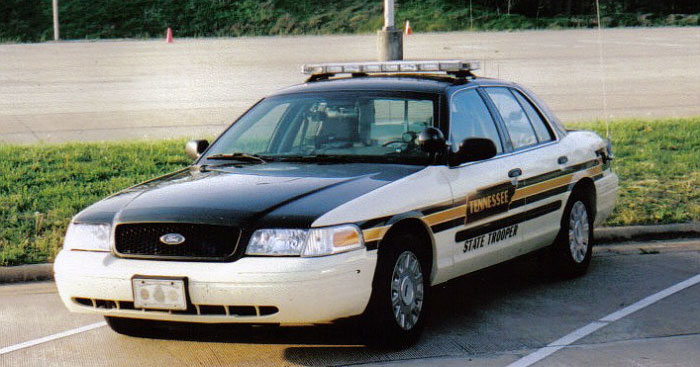
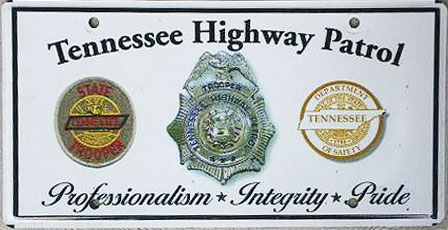 Three-Emblem front plate.
Three-Emblem front plate. 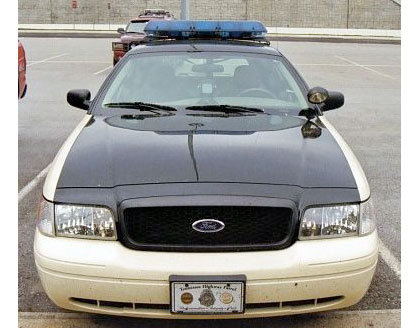
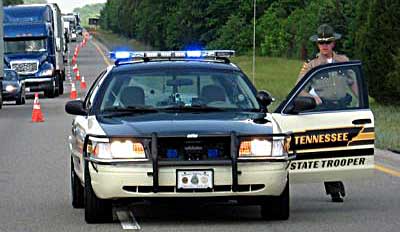
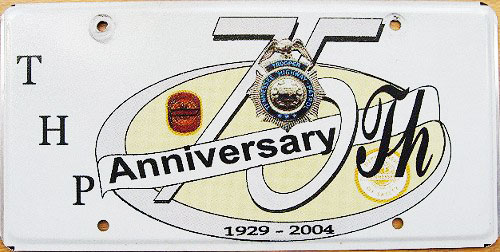 2004 75th Anniversary front plate. Screened aluminum.
2004 75th Anniversary front plate. Screened aluminum.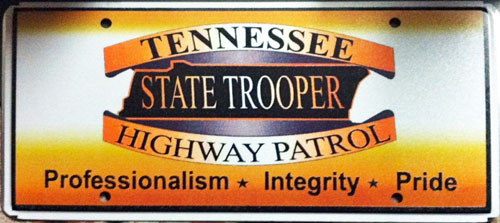 2013-Current front plate.
2013-Current front plate. 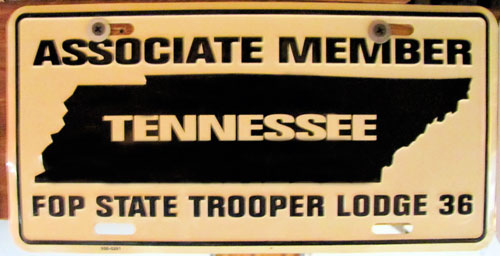 FOP Lodge 36 booster plate.
FOP Lodge 36 booster plate. 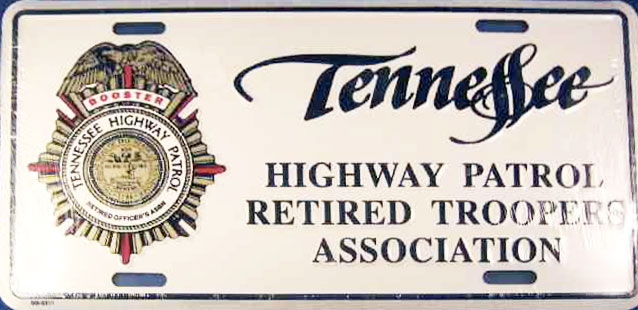 THP retired Troopers Association booster plate.
THP retired Troopers Association booster plate.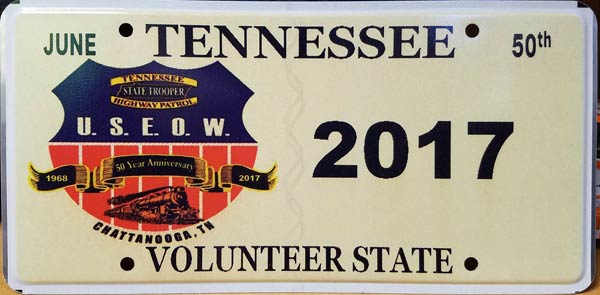 Uniformed Safety Education Officers Workshop souvenir plate.
Uniformed Safety Education Officers Workshop souvenir plate.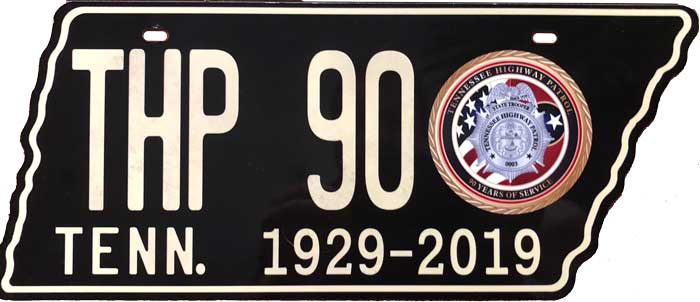 2019- 90th Anniversary Souvenir.
2019- 90th Anniversary Souvenir.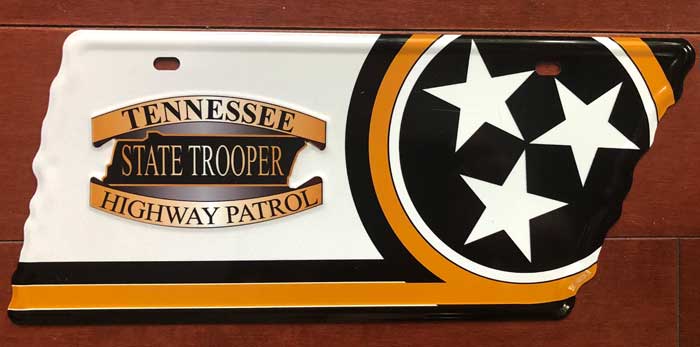 2020-Current state shape front plate.
2020-Current state shape front plate.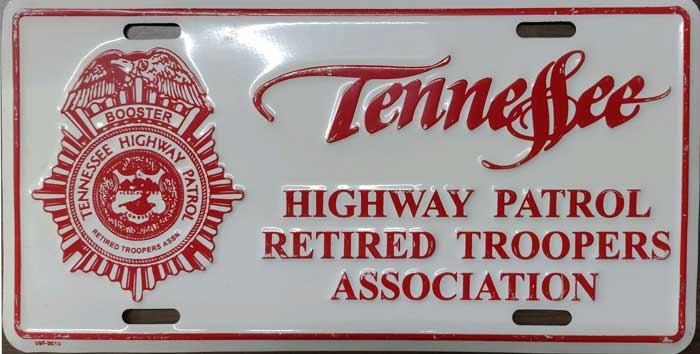 Retired Troopers Association booster.
Retired Troopers Association booster.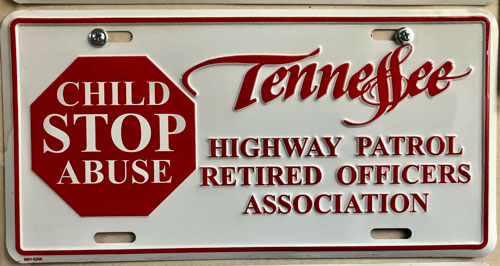 Retired Officers Association booster.
Retired Officers Association booster.As stated in the introduction, the THP had a large fleet of 55 motorcycles when they commenced patrolling in 1930. The records indicate that the THP used standard civilian motorcycle license plates with low numbers.
Motorcycle license plates during this time would have been as follows:
1931: Embossed steel. Approx. 3" x 6". Yellow over black. ## followed by TENN over 1931.
1932: Embossed steel. Approx. 3" x 6". White over red. ## followed by TENN over 1932.
1933: Embossed steel. Approx. 3" x 6". Cream over brown. ## followed by 1933 over TENN.
1934: Embossed steel. Approx. 3" x 6". White over green. ## over TENN 34.
1935: Embossed steel. Approx. 3" x 6". White over brown. 1935 over TENN followed by ##
1936: Embossed steel state shape. Approx. 3 1/2" x 8". White over red. TENNESSEE 36 over A ##
1937: Embossed steel state shape. Approx. 3 1/2" x 8". Black over yellow. A ## over TENNESSEE 37
1938: Embossed steel state shape. Approx. 3 1/4" x 7 1/4". Blue over silver. A ## over TENN 38
1939: Embossed steel state shape. Approx. 3 1/4" x 7 1/4". Red over silver. A ## over TENN 39
(NOTE: the period photo below shows a group of Tennessee Highway Patrol motorcycles all bearing 1939 Tennessee motorcycle license plates commencing with county code 96 followed by numbers 39, 40, 48 and 80 respectively.
County 96 was assigned as the state's Motor Vehicle Title and Registration Secretary within the Department of Revenue.
In turn, the plates were delivered to the Motor Vehicle Management of the Department of General Services.
This office then decided which state agency got which numbers.
These were issued despite THP motorcycles being state run and thus not needing a county designation after 1939.
A small A prefix alone was supposed to prefix the number as seen on the two 1938 motorcycles A 27 and A 89 seen further below.
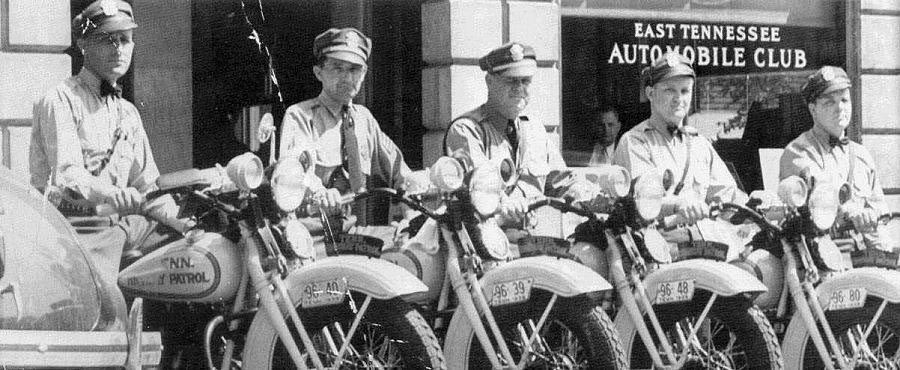
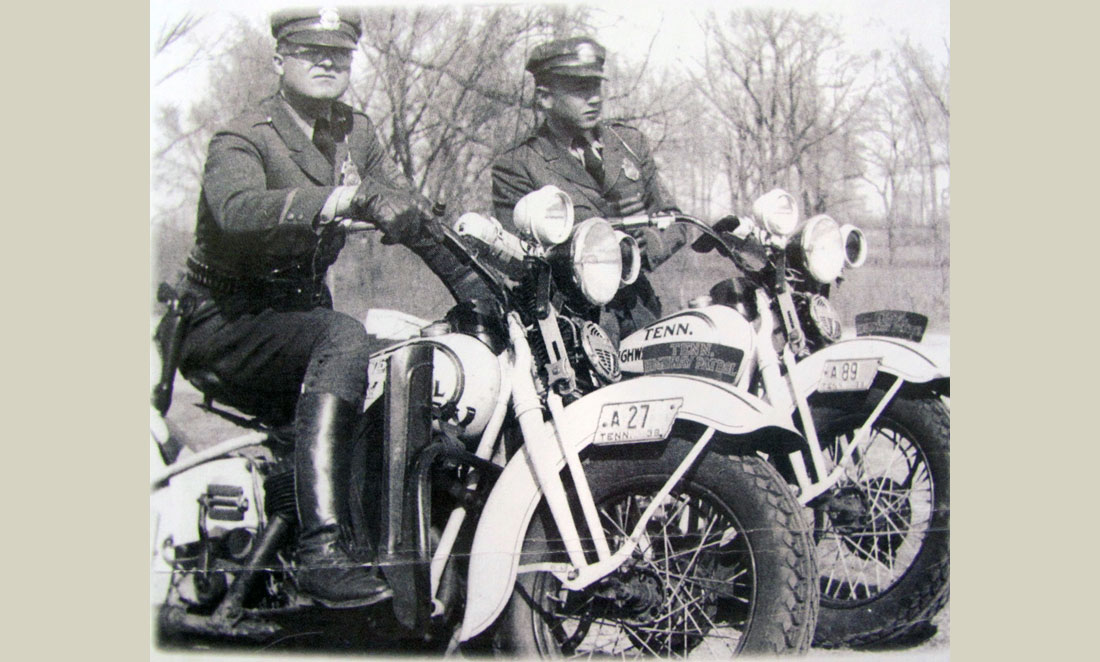
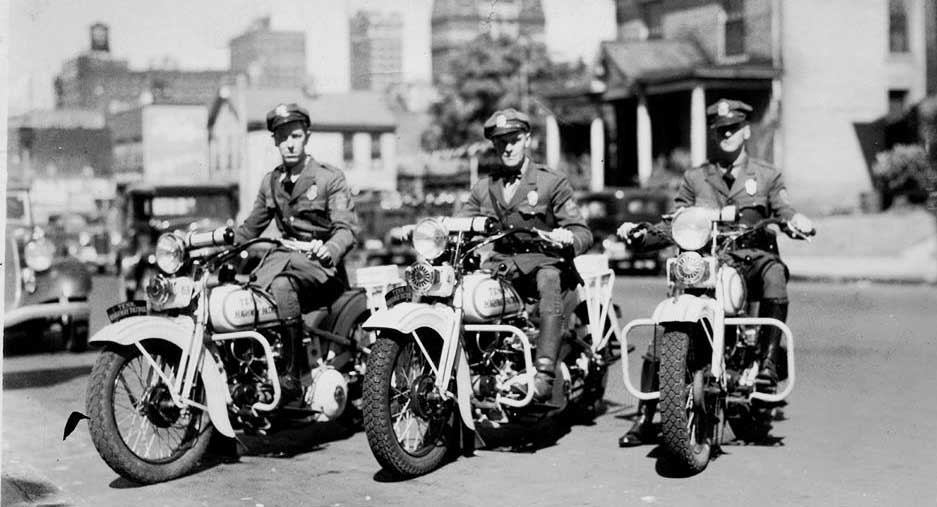
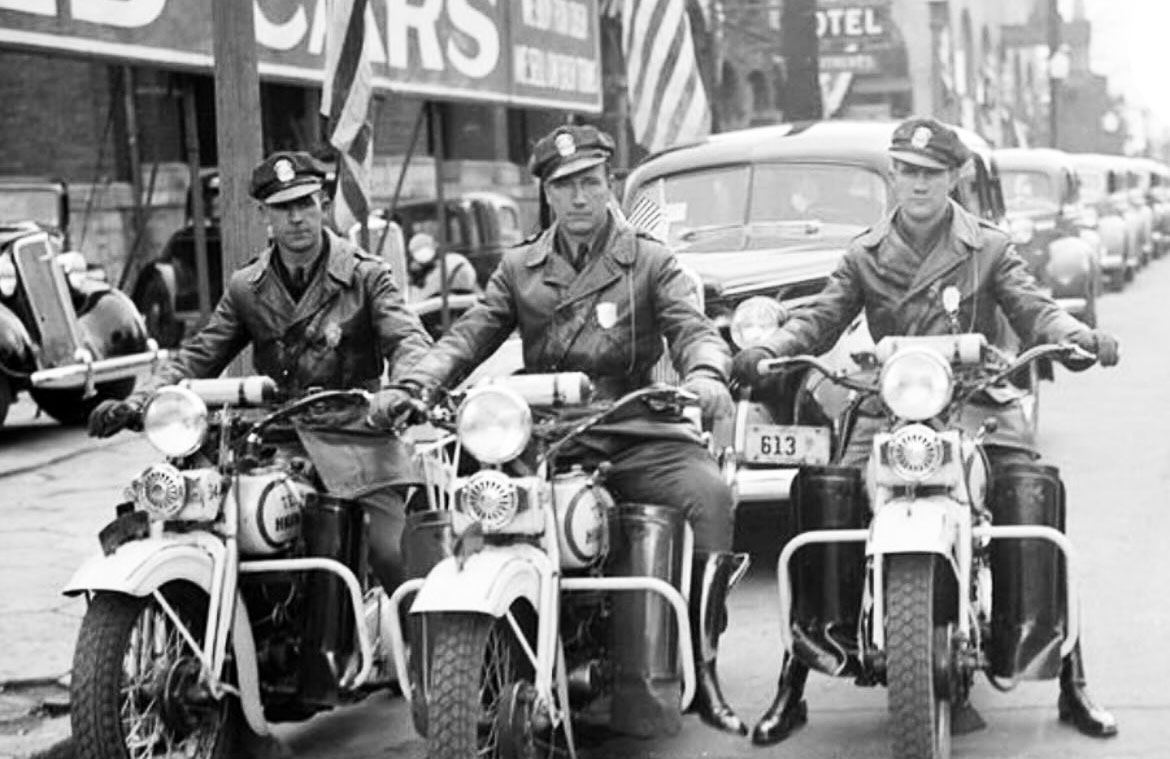
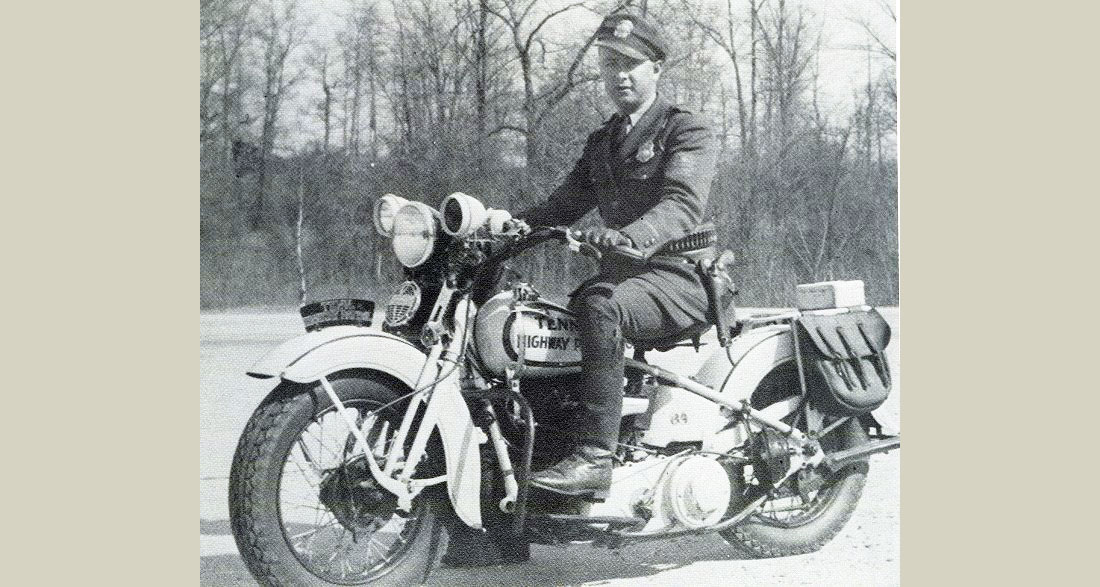
1940: Embossed steel state shape. Approx. 3 1/4" x 7 1/4". Orange over black. A ## over TENN. 1940
1941: Embossed steel state shape. Approx. 3 1/4" x 7 1/4". White over red. A ## over TENN. 1941
1942: Embossed steel state shape. Approx. 3 1/4" x 7 1/4". Black over white. A ## over TENN. 1942
1943: Unknown- possibly not issued due to metal conservation during World War 2.
1944: Embossed steel state shape. Approx. 3 1/4" x 7 1/4". White over black. A ## over TENN. 1944
1945: Unknown- possibly not issued due to metal conservation during World War 2.
1946: Embossed steel state shape. Approx. 3 1/4" x 7 1/4". Green over silver. A ## over TENN. 1946
1947: Embossed steel state shape. Approx. 3 1/4" x 7 1/4". White over black. A ## over TENN. 1947
1948: Embossed steel state shape. Approx. 3 1/4" x 7 1/4". Black over pale yellow. A ## over TENN. 1948
1949: Embossed steel state shape. Approx. 3 1/4" x 7 1/4". Yellow over black. A ## over TENN. 1949
It was around 1950 when it was believed that special state government license plates were issued to motorcycles operated by the THP. The plates were stated to have measured 3 3/8" x 8" (state shaped)and made of embossed steel. The color scheme was white embossed characters over a red background. A number up to 2 digits was embossed over TENN.
In the late 1950's, the same size and formatting was used but the background color changed from red to dark green.
In 1960, a black over white motorcycle license plate was issued in the same dimension with two numbers over TENN.1960.
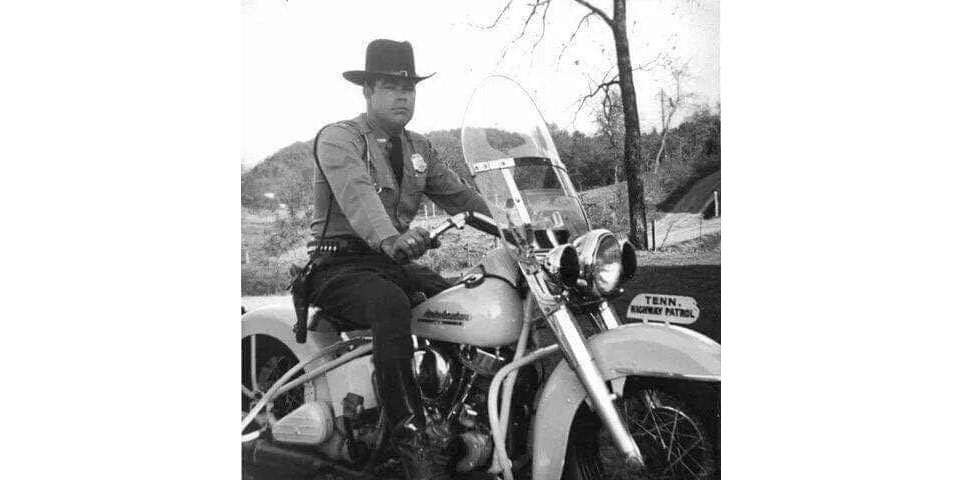 1950's
1950's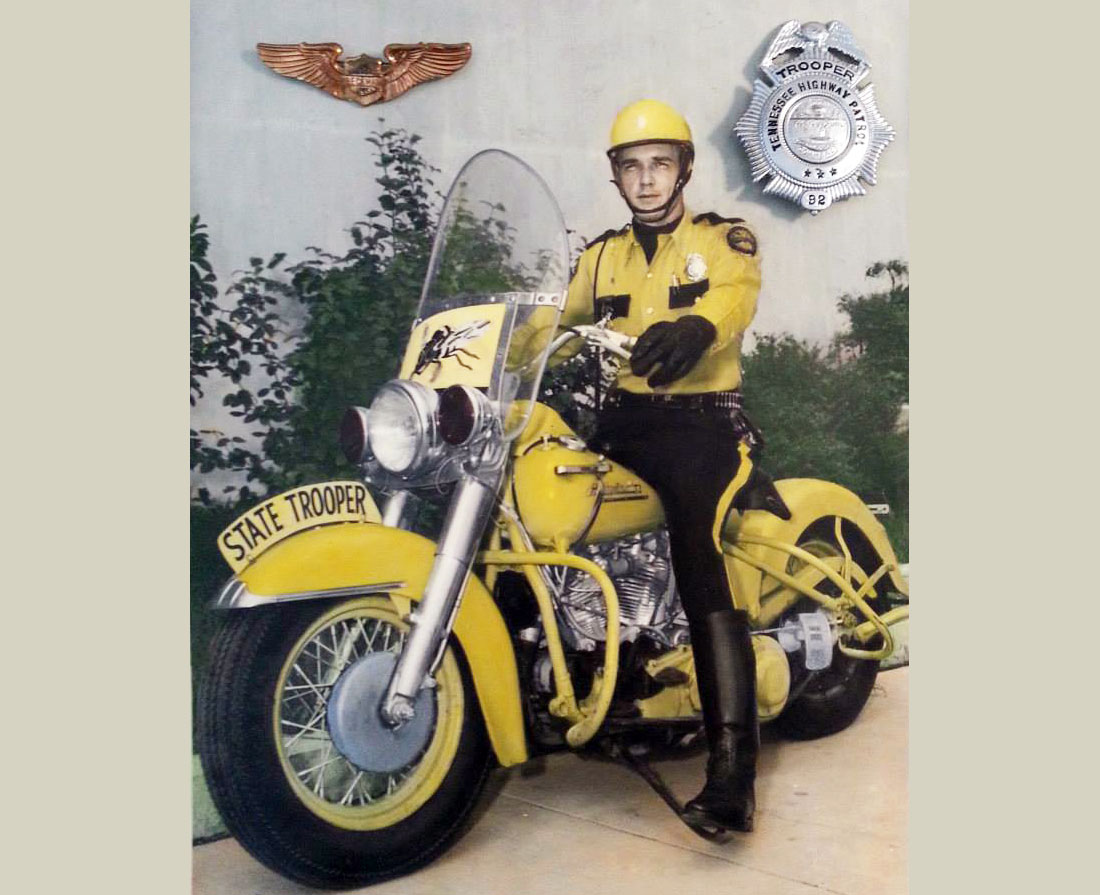 Trooper Edward L. Beckman- One of the THP's original "Yellow Jackets"
Trooper Edward L. Beckman- One of the THP's original "Yellow Jackets" 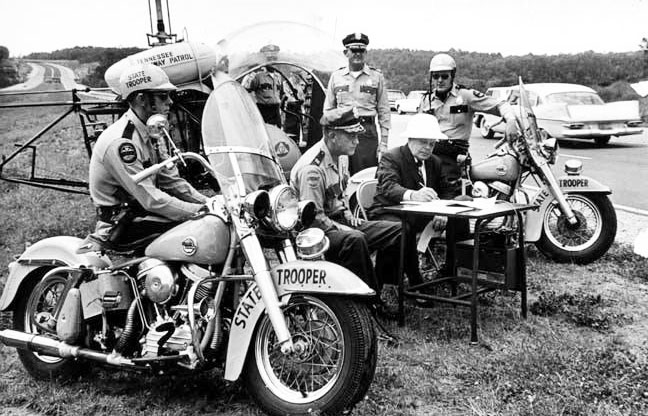
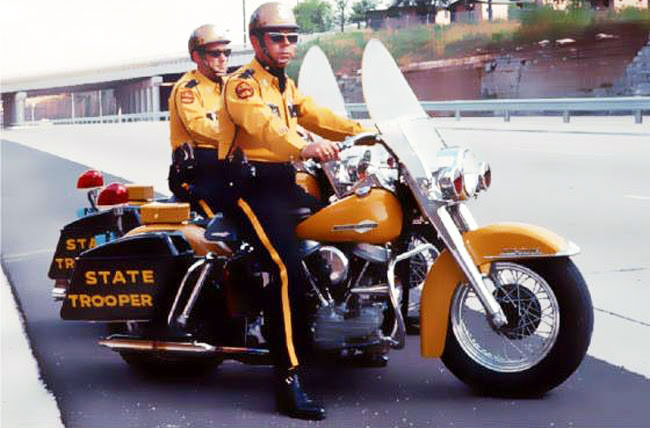
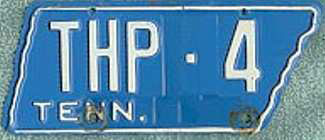 1961-late 1960's THP Motorcycle issue. Embossed steel.
1961-late 1960's THP Motorcycle issue. Embossed steel.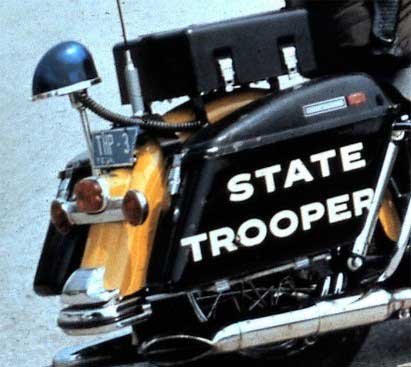 THP-3 ready to go !
THP-3 ready to go !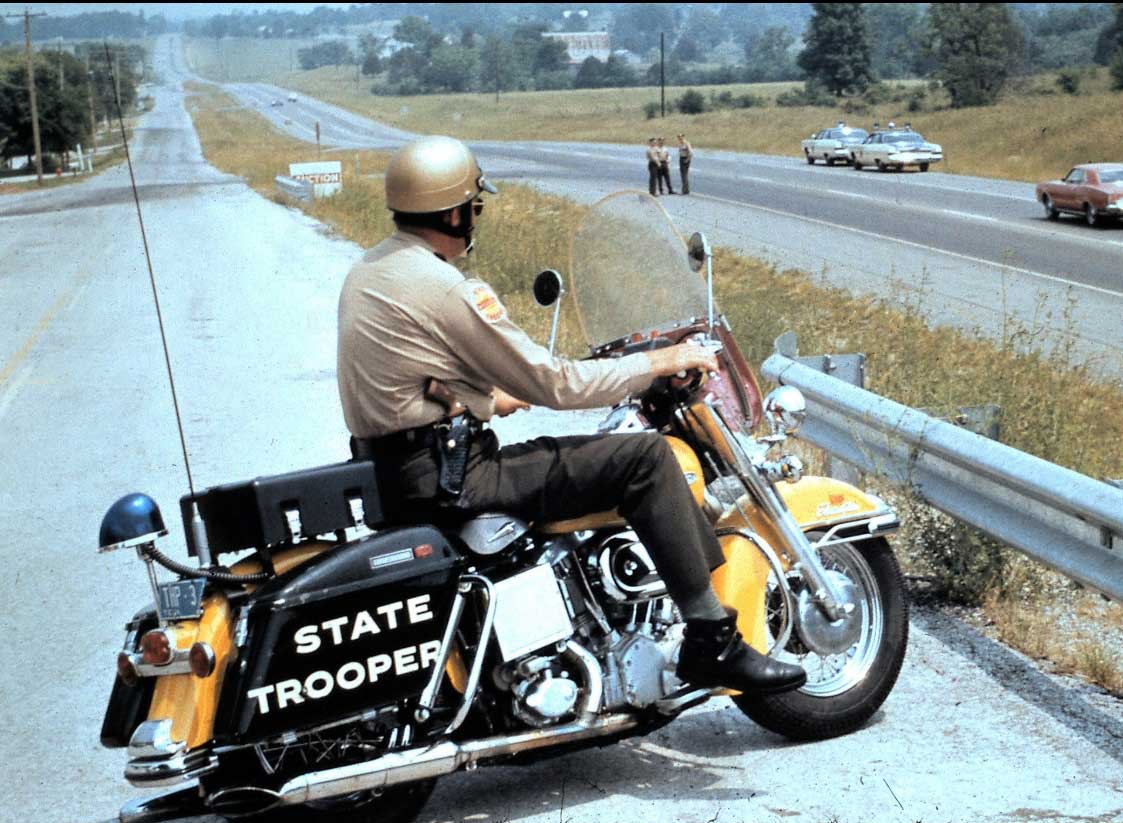
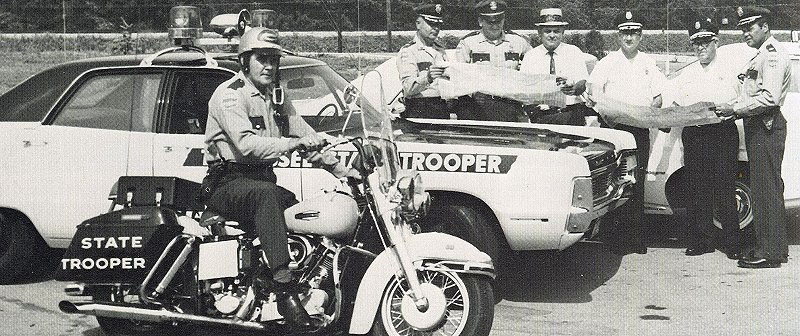
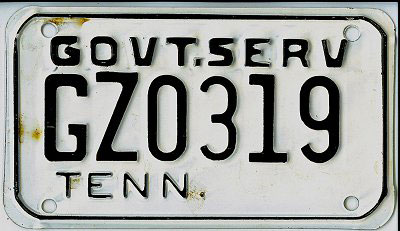 Late 1960's-1974 motorcycle issue.
Late 1960's-1974 motorcycle issue.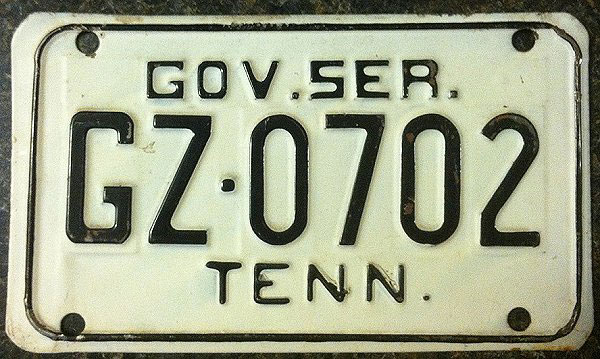 Late 1960's-1974 motorcycle issue.
Late 1960's-1974 motorcycle issue.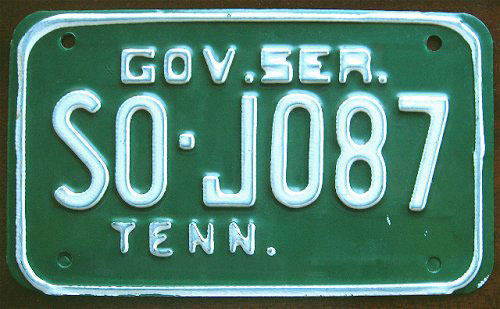 1974-Circa 1980's motorcycle issue.
1974-Circa 1980's motorcycle issue. 
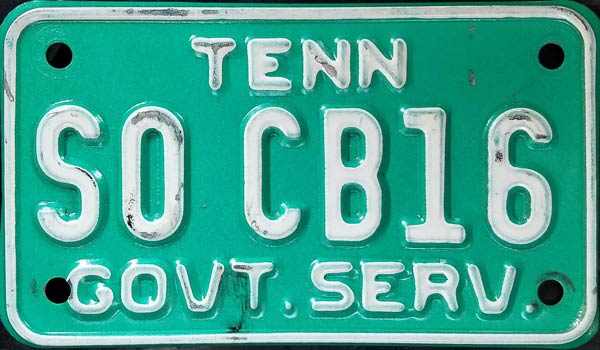 Circa 1980's-1991 motorcycle issue.
Circa 1980's-1991 motorcycle issue. 
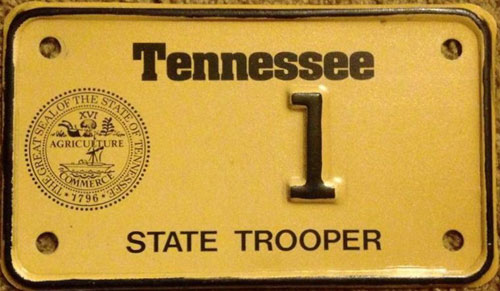 1991-2007 motorcycle issue.
1991-2007 motorcycle issue. 
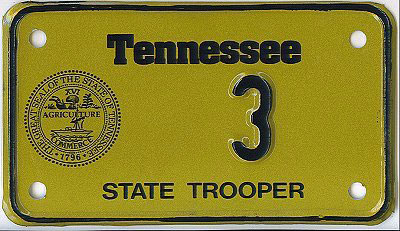 1991-2007 motorcycle issue.
1991-2007 motorcycle issue. 
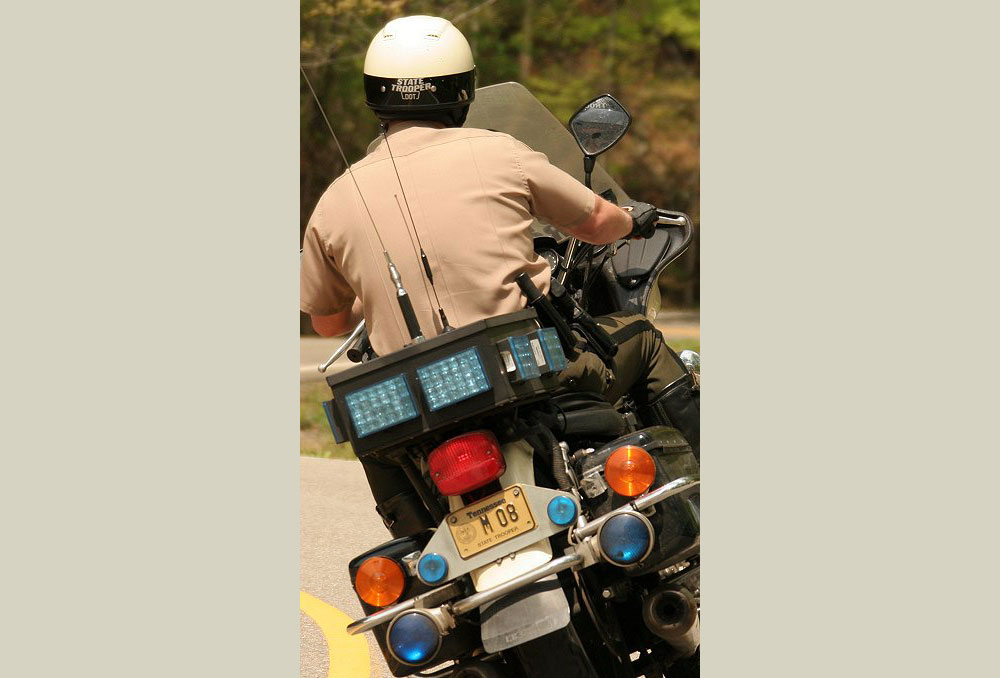
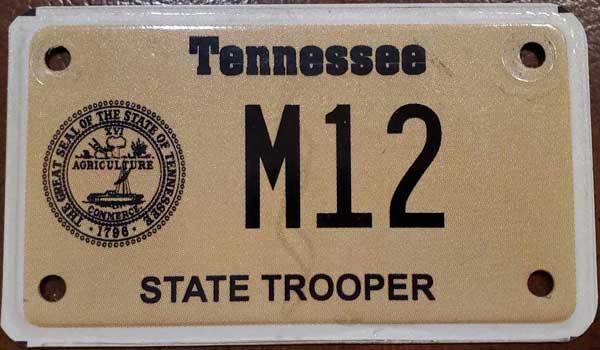 Circa 2007-Current motorcycle issue.
Circa 2007-Current motorcycle issue. 
The Tennessee Highway Patrol Commercial Vehicle Enforcement Division operates six commercial vehicle inspection sites throughout the state. Other major commercial vehicle enforcement activities include inspecting commercial vehicles and driver logs, patrolling highways with a focus on truck traffic violations, and weighing the commercial vehicles both at Interstate Inspection Stations and with portable scales along the highway.
License plates used by this agency used the same early white over light blue color and format of the 1961-1973 THP license plates but with an MVE prefix.
Later, the agency opted for the white over green Tennessee Government Service license plates.
In 1991, however, this unit unveiled a graphic license plate in the same color and formatting as the Tennessee Highway Patrol. The reflective tan aluminum plates had the state name silkscreened in black at the top center between the upper mounting holes. COMMERCIAL VEHICLE over ENFORCEMENT was silkscreened in black along the bottom center of the plate between the lower mounting holes.
The Tennessee state seal was silkscreened in black and occupied the left center field of the plate. A four digit number was embossed in black to the right of the seal.
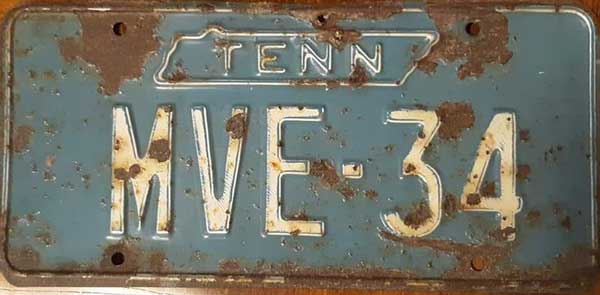 1961-1973 Motor Vehicle Enforcement.
1961-1973 Motor Vehicle Enforcement.
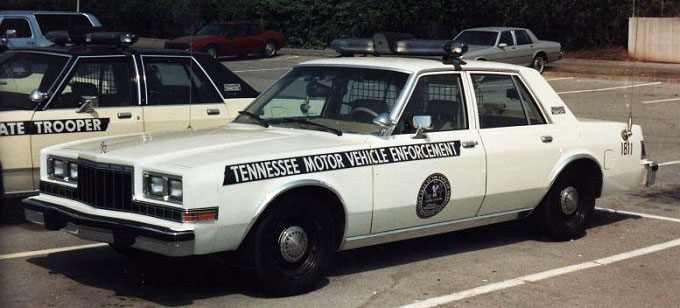
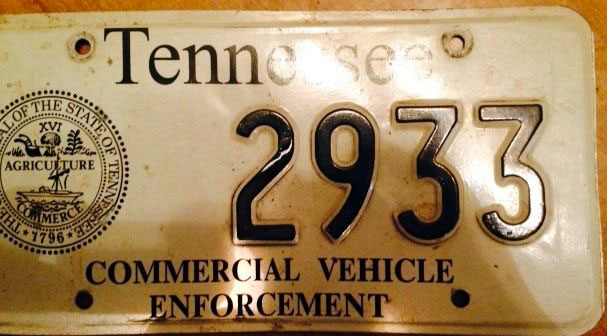 1991-Current CVE Issue. Embossed aluminum.
1991-Current CVE Issue. Embossed aluminum.
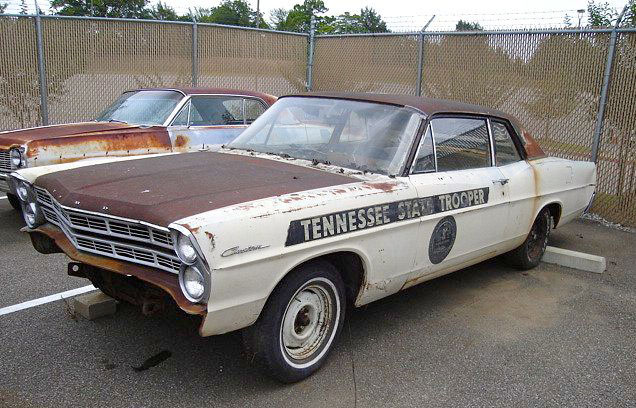 In June of 2007, Randy Barclay and his brother Jake purchased a derelict 1967 Ford Custom 428 from Holt's Salvage Yard in Fayetteville TN for $625 and saved it in the nick-of-time from the portable crusher. The attraction to the brothers was to have a classic car to restore that was unique and challenging for two guys who already had a knack for bringing older forgotten cars back to a new life on the road.
In June of 2007, Randy Barclay and his brother Jake purchased a derelict 1967 Ford Custom 428 from Holt's Salvage Yard in Fayetteville TN for $625 and saved it in the nick-of-time from the portable crusher. The attraction to the brothers was to have a classic car to restore that was unique and challenging for two guys who already had a knack for bringing older forgotten cars back to a new life on the road.
The car had been registered to the Tennessee Department of Safety in Nashville, so the idea of restoring an old THP cruiser was a rare and exciting opportunity for the two men. The restoration on the old Ford began by May of 2008 as the brothers were already in the midst of another restoration on a 1955 Chevy.
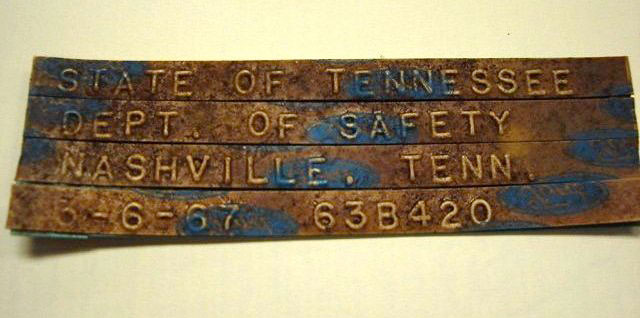
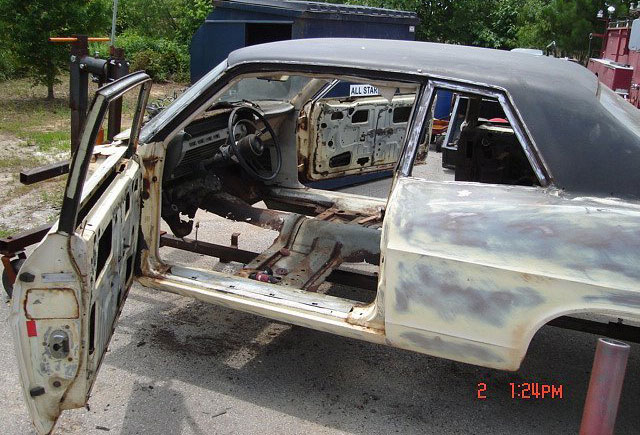
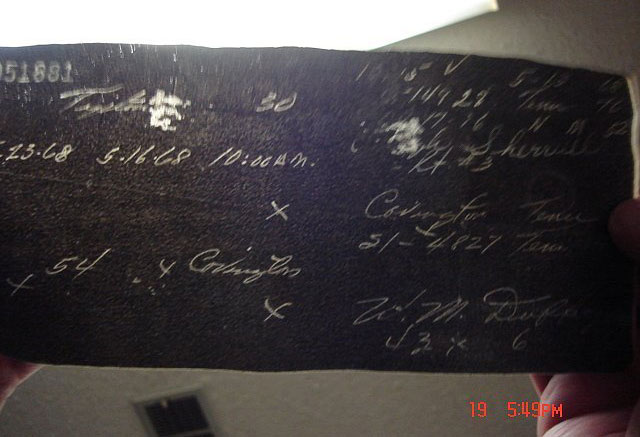
The Barclay brothers were breaking down the VIN Codes and the Trim Codes of the car, and they found out what they really had: A 428 ci with no power steering, and no air conditioning. This is when they became interested in knowing what kind of a man could drive a car like this day in and day out. In the depths of the ashtray inside the car, was the carbon paper from a gas station receipt issued in Covington TN dated May 16 1968 and signed by a W.M. Duffey. The search began for the man behind the gas purchase and who apparently also smoked unfiltered Lucky Strike cigarettes some 40 years earlier.
They started trying to track-down this guy through conventional methods, not knowing his age, if he was alive or dead, or even if he lived in the state anymore. A lead brought them to an 84 year-old Walter M Duffey living in Brownsville TN.
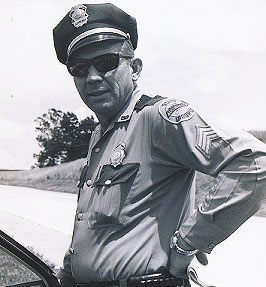
The Walter Duffey who answered the phone that day was the son of the retired Lieutenant with the Highway Patrol who advised that the senior Walter was recently admitted to a hospital in Jackson TN due to a bad fall. Randy and his brother Jake raced-off to the hospital in Jackson armed with every available photo of the old Ford to at least get the information passed to Walter via the nursing staff. The nurse called-over Mrs Duffey who had already been at her ailing husband's bedside to hear what these two nice young men from Mississippi had to say and show. Not a moment was hesitated to bring Randy and Jake into Walter's hospital room to show him what they had found and what they were bringing back to its former glory. This gave Walter his "second wind" and his recovery was bolstered by the notion that his old patrol car was found and being restored.
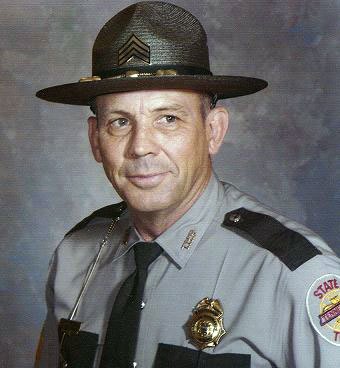
Walter who had a very seasoned and celebrated career with the Tennessee Highway Patrol recalled one instance that took place in that very car "back in the day". Sgt (then) Walter Duffey while on routine patrol had the opportunity to arrest two men. One man was handcuffed and placed in the back seat of the patrol car while the other male was riding up front in the passenger seat. The male up front was able to wrestle Sgt Duffey's gun away from him, and a kidnapping of one of Tennessee's finest was now underway. The men drove Sgt Duffey a few miles away and then pulled over to order him out of the car. The passenger in the rear was able to talk the gunman out of the idea of shooting Sgt Duffey and the two fugitives took-off in that Ford 428, leaving it abandoned some miles away when they could make good their escape.
The old Ford patrol car has been painstakingly restored using period-correct equipment and paint as well as decals and trim. In fact, once the first meeting took place between the Barclay brothers and Walter, they kicked-up the pace of the project to complete the restoration and the '55 Chevy project was placed on the back-burner. They obtained a blue-dome rotator light which was introduced for the THP in 1967, the radio equipment and siren from that era were added as well as a new-old-stock spotlight that was the precise kind used on these patrol cars at the time. The motor and transmission were found in Michigan. They came out of a T-Bird with 29,000 miles on it. The 428 in the Ford Customs were actually T-Bird engines that year. As Randy told me: " The motor was never rebuilt, just some gaskets freshened up and things like oil pump, water pump,etc. It runs like an ace, no smoke, no misses, like it wants to run down some moonshiners."
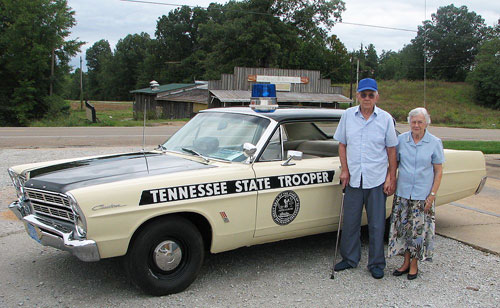
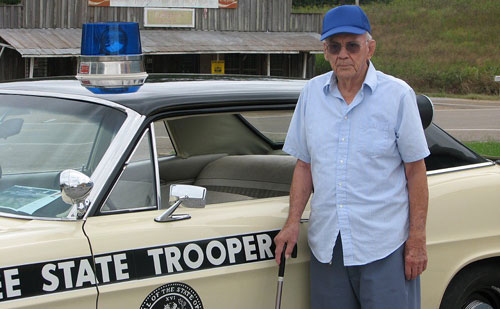
As for the license plates, they are excellent embossed metal reproductions. Those of us in this hobby know well-enough how hard it is to find originals in any condition aside from rust-on-rust! The color and layout on these reproductions are spot-on, and an assignment number beginning with a 4 is correct for the Brownsville District where this car and Sgt Walter Duffey ran their beat. With the car being a 428, no other number could be more appropriate for such a wonderful tribute to the patrol cars of the muscle era and the Tennessee Highway Patrol as well. The Barclay brother's "Duffey car" as I call it, makes appearances at THP functions and serves as a rolling tribute to the proud history of excellence of the Tennessee Highway Patrol and the integrity of fine patrol officers like Walter M. Duffey.
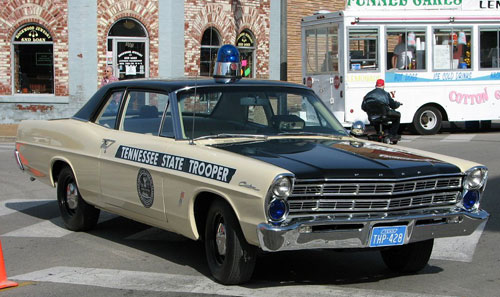
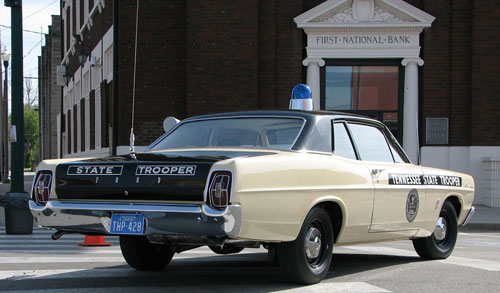
Statetrooperplates.com wants to deeply thank Randy and Jake Barclay of Nesbit and Southaven MS respectively for their marvelous contribution, and to Retired Lt Walter M. Duffey of Brownsville TN for leaving that gas receipt in the ashtray of that old Ford 40 years ago so that he could be reunited with that car and have his name and career live-on for the ages!
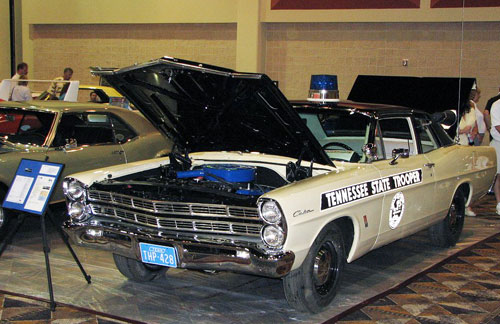
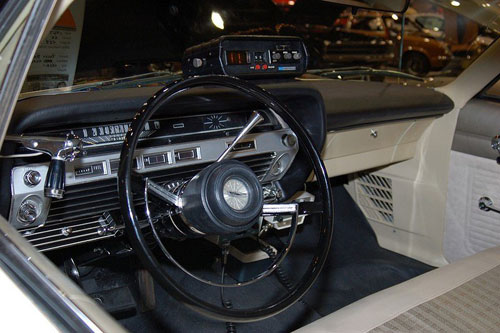
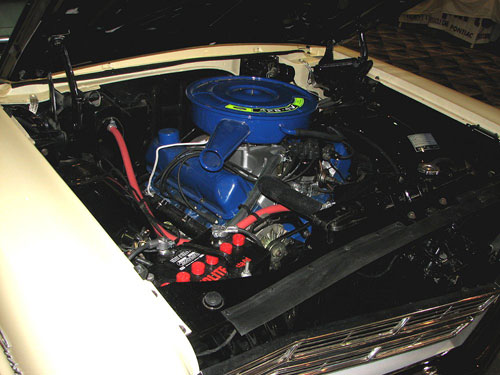
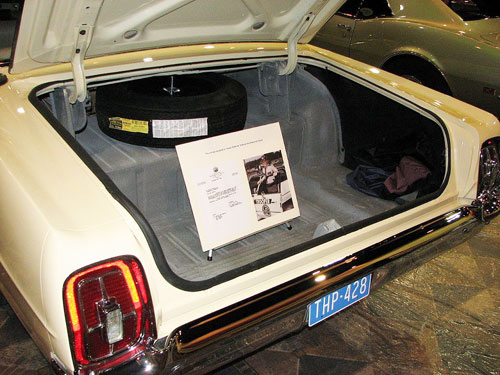
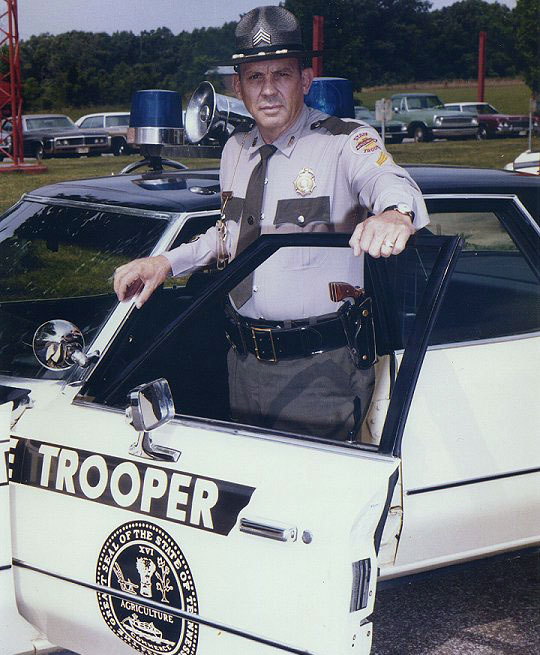
..by the way...Walter confirmed that those unfiltered Lucky Strikes left behind in that same ashtray was his brand back in the day!